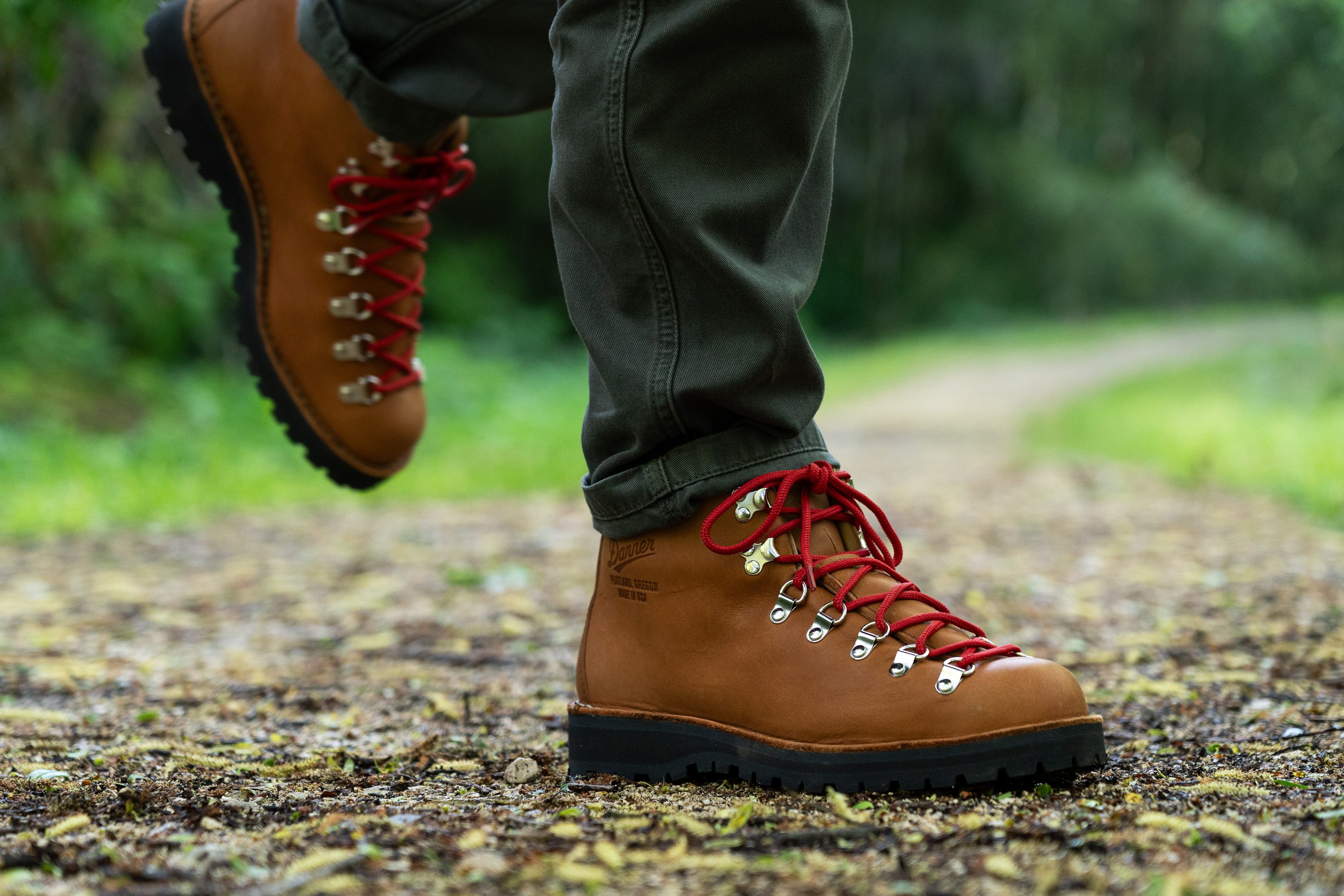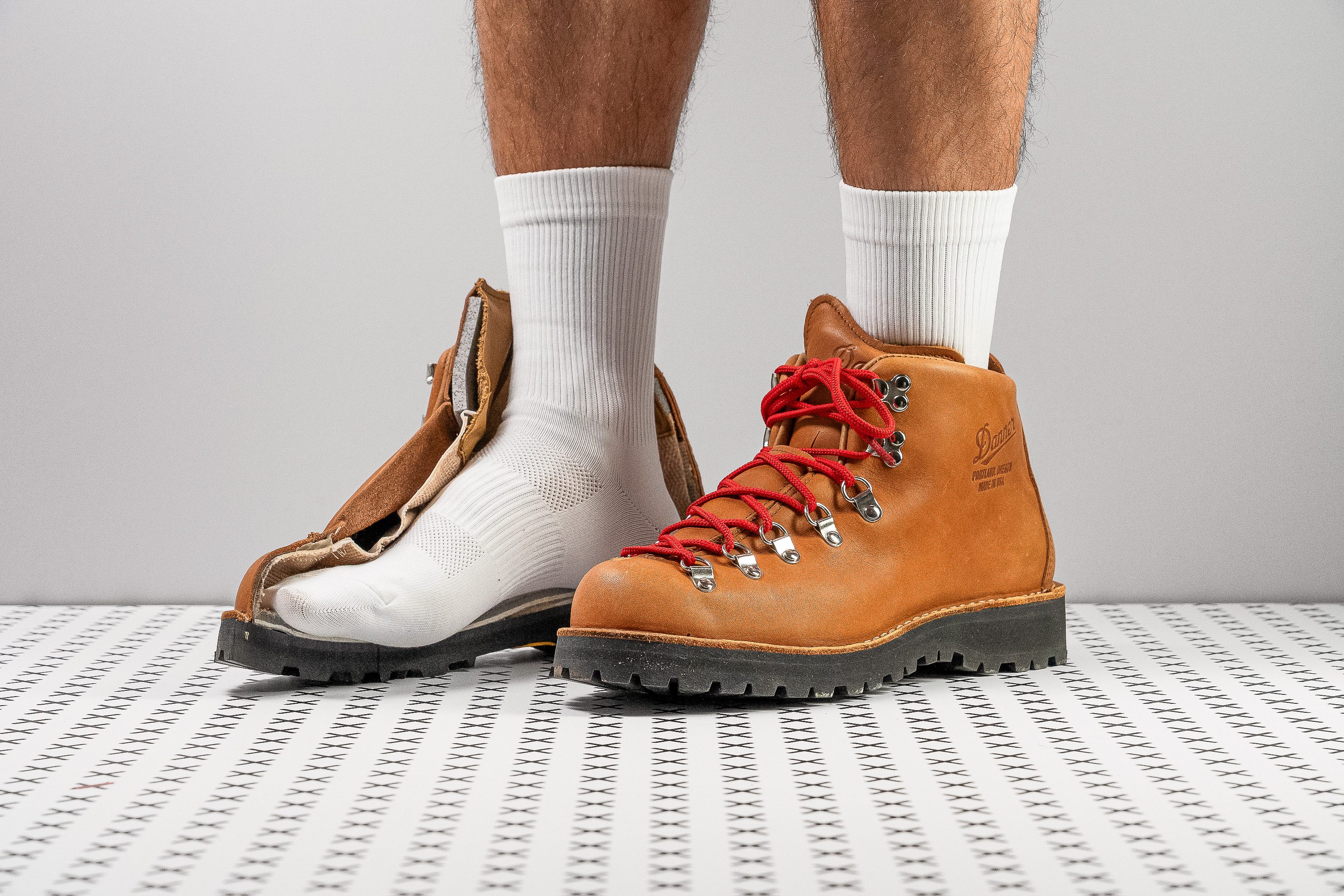Our verdict
- Top pick in best leather hiking boots
- Top pick in best Danner hiking boots
Pros
- Highly durable leather and rubber
- Premium materials and craftsmanship
- Top-notch waterproofing
- Can be resolved and recrafted
- Secure lockdown and support
- Very stable and reliable platform
- Sexy and snazzy vintage look
Cons
- Underfoot cushioning feels non-existent
- Breaking in takes time and effort
- The heaviest boot out there
- VERY expensive
Audience verdict
- Top 10% in hiking boots
- Top 9% in waterproof hiking boots
- Top 13% most popular hiking boots
Comparison
The most similar hiking boots compared
+ + Add a shoe | |||||
|---|---|---|---|---|---|
| Audience score | 91 Superb! | 90 Great! | 88 Great! | 84 Good! | |
| Price | $440 | $255 | $300 | $230 | |
| Trail terrain | Technical | Technical | Moderate | Technical | |
| Shock absorption | Low | Moderate | Low | Low | |
| Energy return | Low | High | Moderate | Moderate | |
| Weight lab Weight brand | 28.3 oz / 802g 31 oz / 879g | 21.1 oz / 597g 19.5 oz / 553g | 24.8 oz / 704g 24.3 oz / 690g | 23.4 oz / 663g 23.1 oz / 655g | |
| Breathability | Warm | Warm | Warm | Warm | |
| Use | BackpackingDay HikingSnow | BackpackingDay HikingSnow | BackpackingDay Hiking | BackpackingDay HikingSnow | |
| Orthotic friendly | ✗ | ✓ | ✓ | ✓ | |
| Drop lab | 15.2 mm | 17.2 mm | 20.0 mm | 18.0 mm | |
| Size | True to size | True to size | True to size | True to size | |
| Midsole softness | Firm | Balanced | Firm | Balanced | |
| Difference in midsole softness in cold | Small | Small | Normal | Normal | |
| Heel counter stiffness | Flexible | Flexible | Stiff | Stiff | |
| Stiffness | Moderate | Moderate | Moderate | Stiff | |
| Outsole hardness | Very hard | Average | Average | Average | |
| Waterproofing | Waterproof | Waterproof | Waterproof | Waterproof | |
| Material | Leather | Leather | Suede | Textile | |
| Season | Winter | Winter | Winter | Winter | |
| Toebox durability | Good | Good | Good | Good | |
| Heel padding durability | Good | Decent | Decent | Good | |
| Outsole durability | Decent | Decent | Decent | Decent | |
| Width / fit | Narrow | Medium | Medium | Wide | |
| Toebox width | Narrow | Narrow | Narrow | Medium | |
| Lug depth | 5.8 mm | 5.1 mm | 3.6 mm | 4.7 mm | |
| Heel stack lab | 41.2 mm | 37.8 mm | 42.1 mm | 38.0 mm | |
| Forefoot | 26.0 mm | 20.6 mm | 22.1 mm | 20.0 mm | |
| Widths available | NormalWide | NarrowNormalWide | NormalWide | Normal | |
| Technology | Gore-TexVibram | Gore-TexVibram | Gore-Tex | Gore-TexOrtholite | |
| Cut | Mid cut | Mid cut | Mid cut | High cut | |
| Removable insole | ✗ | ✓ | ✓ | ✓ | |
| Ranking | #4 Top 10% | #7 Top 18% | #14 Top 35% | #25 Bottom 39% | |
| Popularity | #5 Top 13% | #16 Top 40% | #15 Top 37% | #9 Top 22% |
Who should buy
We believe that the Danner Mountain Light is the perfect boot for you if:
- You're a diehard for classic leather boots with vintage lumberjack aesthetics
- You need a rugged, stable, and highly durable backpacking boot
- You want the best-in-class waterproofing with a Gore-Tex membrane and a fully attached tongue
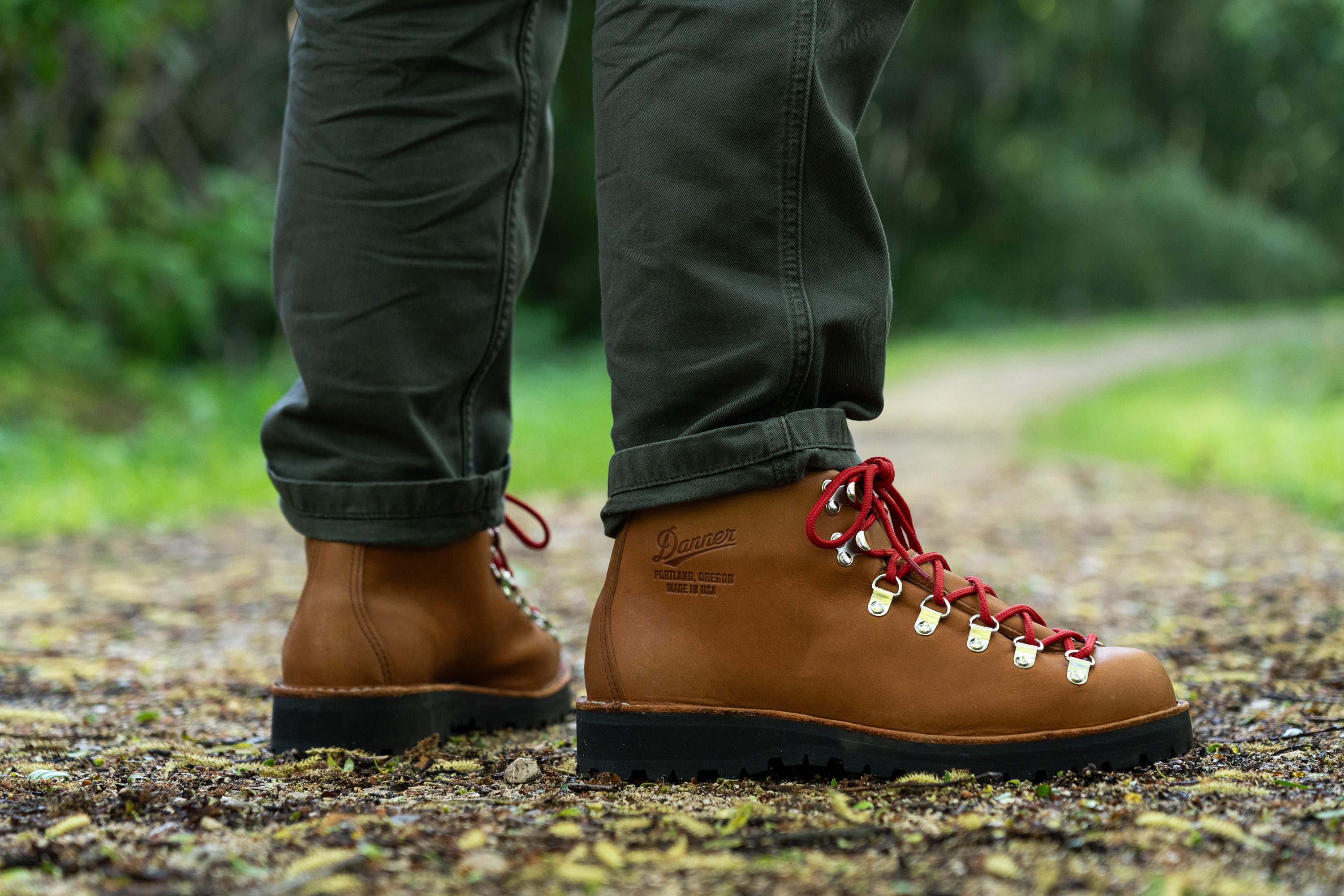
Who should NOT buy
Despite its many advantages, we aren't convinced that this Danner boot is worth such an eye-moistering price tag. Aesthetics aside, we believe that you can find an equally trail-ready leather boot at a much lower cost.
Say, the Scarpa Terra GTX ($249). It even has a more comfortable in-boot feel and a less arduous break-in. Another sturdy and time-tested backpacking boot is the Lowa Renegade GTX Mid ($255).
Both options are also 7-8 oz (200-230g) lighter than the Danner Mountain Light!
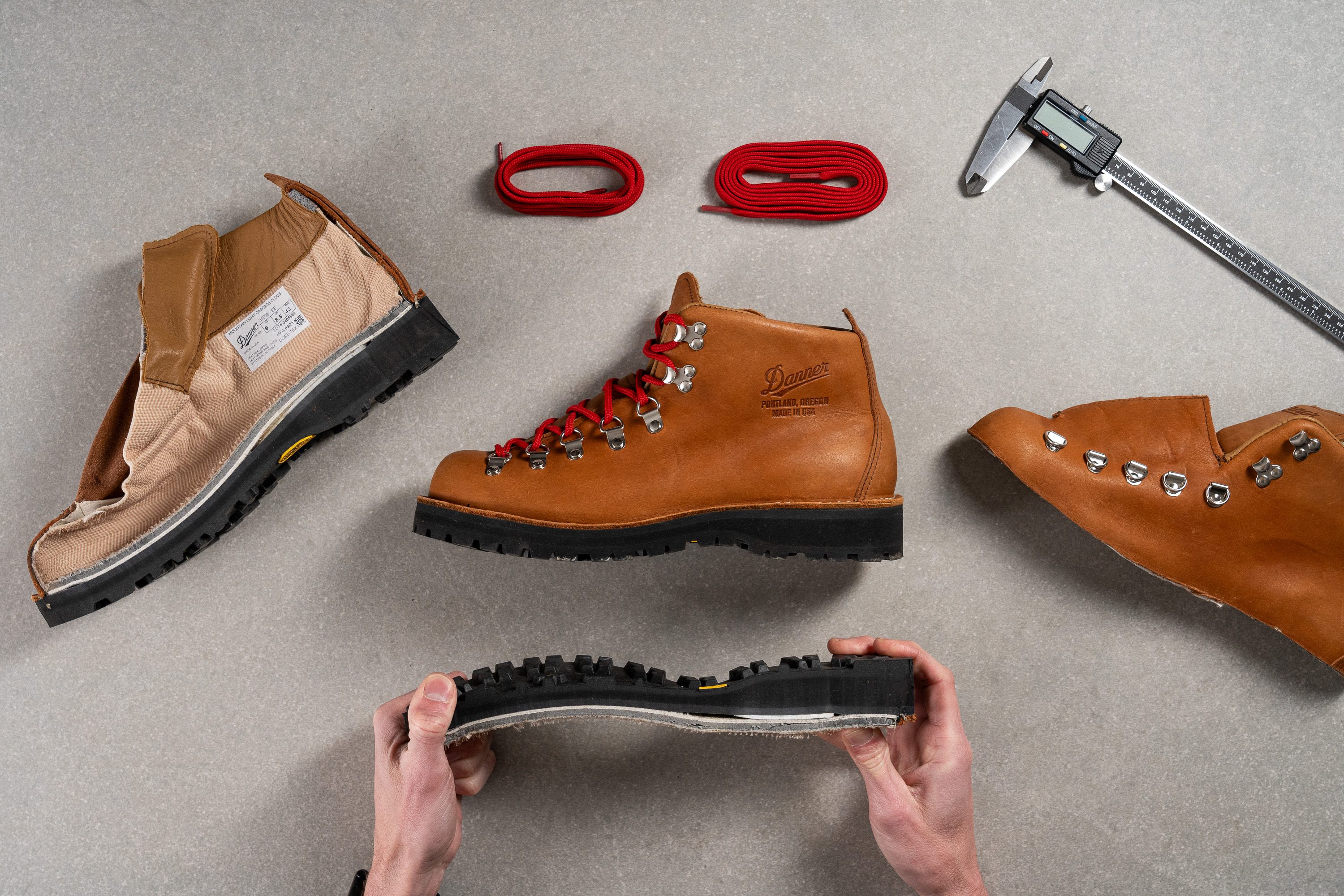
This Danner boot won't make a perfect match for folks with wider feet either. We recommend the Mountain Pass instead as it's built on a more accommodating last.
Cushioning
Shock absorption
Despite its tall platform, the Danner Mountain Light offers very little cushioning underfoot. With a minimal shock absorption of 65 SA, it's a fairly firm ride that can feel harsh for those accustomed to more cushioned boots.
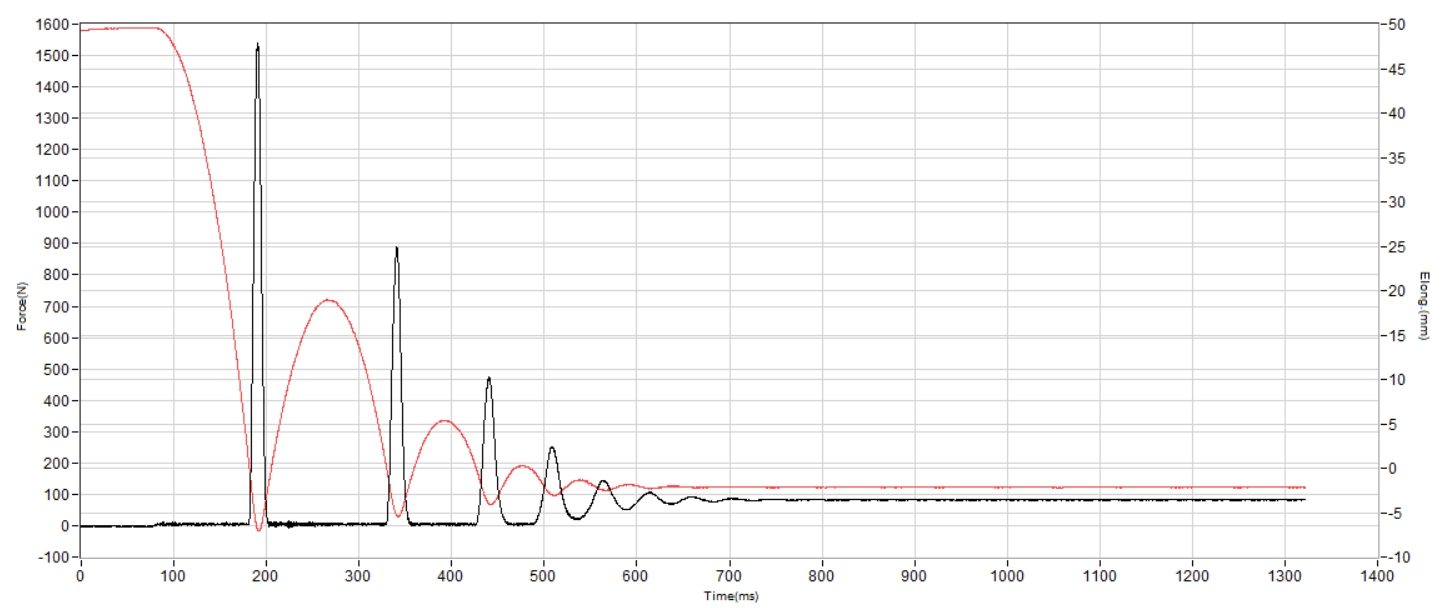
| Mountain Light | 65 SA |
| Average | 93 SA |
Energy return
The energy return of this Danner boot also turned out to be minimal at 43.1%. There is no rebound to make the ride feel dynamic. But it is undeniably one of the most stable hiking boots we've tested.
| Mountain Light | 43.1% |
| Average | 50.5% |
Heel stack
We also found that the Mountain Light kept us high off the ground with its above-average 41.2 mm heel stack.
This Danner boot kept us very surefooted on technical terrain and rocky paths. Stepping on sticks and stones will not be breaking your bones any time soon!
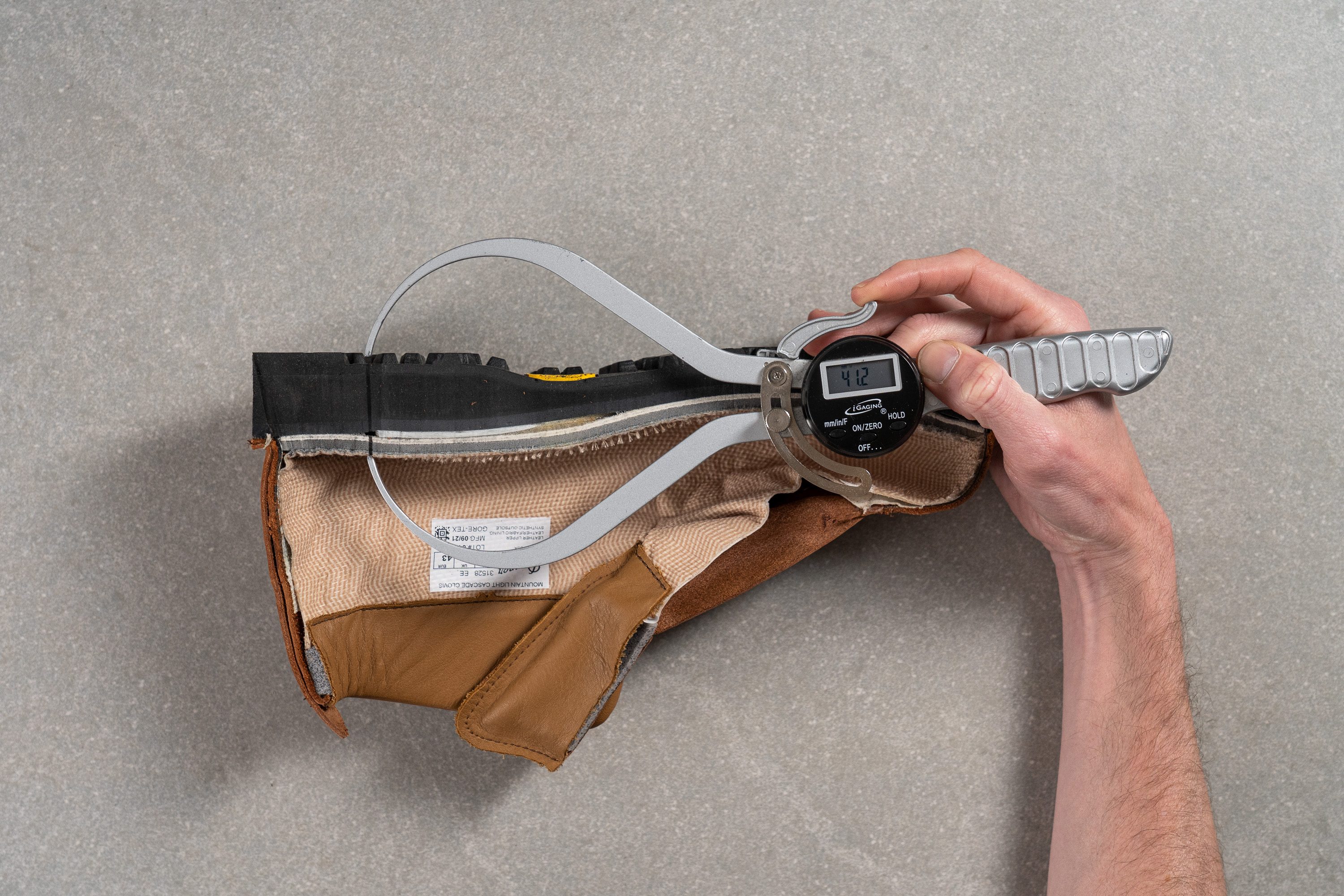
| Mountain Light | 41.2 mm |
| Average | 36.3 mm |
Forefoot stack
In the forefoot, the balls of our feet were separated from the ground by a thick 26-mm platform.
A few millimeters higher than average, it made the boot much stiffer but also more immune to stepping on sharp rocks and other debris.
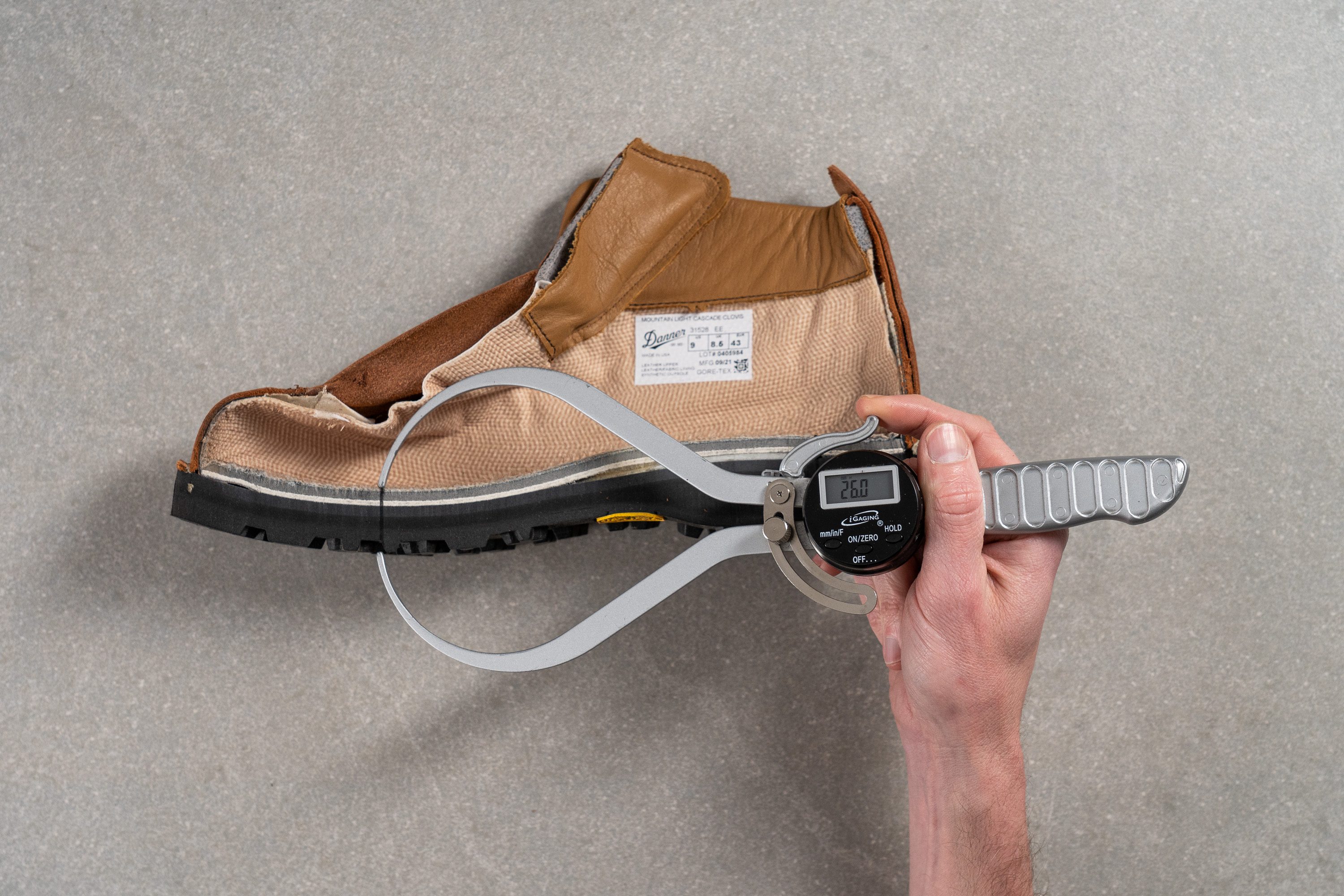
| Mountain Light | 26.0 mm |
| Average | 23.0 mm |
Drop
The difference in stack heights gave us a 15.2 mm drop in the Danner Mountain Light.
We could feel that our heels were slightly more elevated inside the boot but it never caused any discomfort or toe jamming. On the contrary, having that much more substance under our heels made us feel more supported and confident.
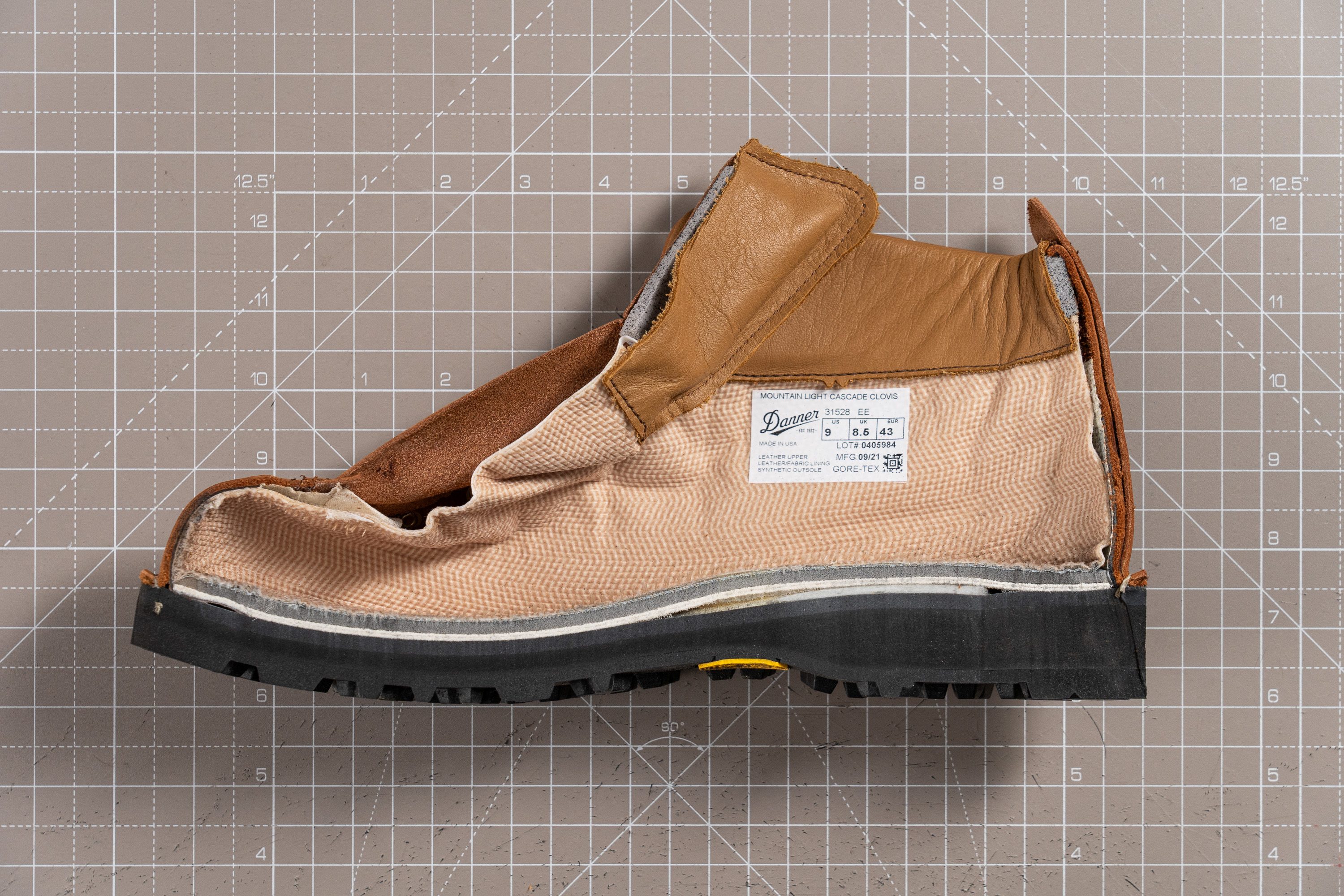
| Mountain Light | 15.2 mm |
| Average | 13.3 mm |
Midsole softness
The Mountain Light offers a very traditional firm experience underfoot. There is no plush foam to provide a squish like in the Hoka Kaha 2 GTX.
Pressing a durometer against the boot's midsole returned a reading of 36.6 HA. It's not the firmest we've measured but it is a good 40% harder than average.
On the other hand, it is 40% softer than the Danner Jag which is one of the firmest boots by far at 51.6 HA!
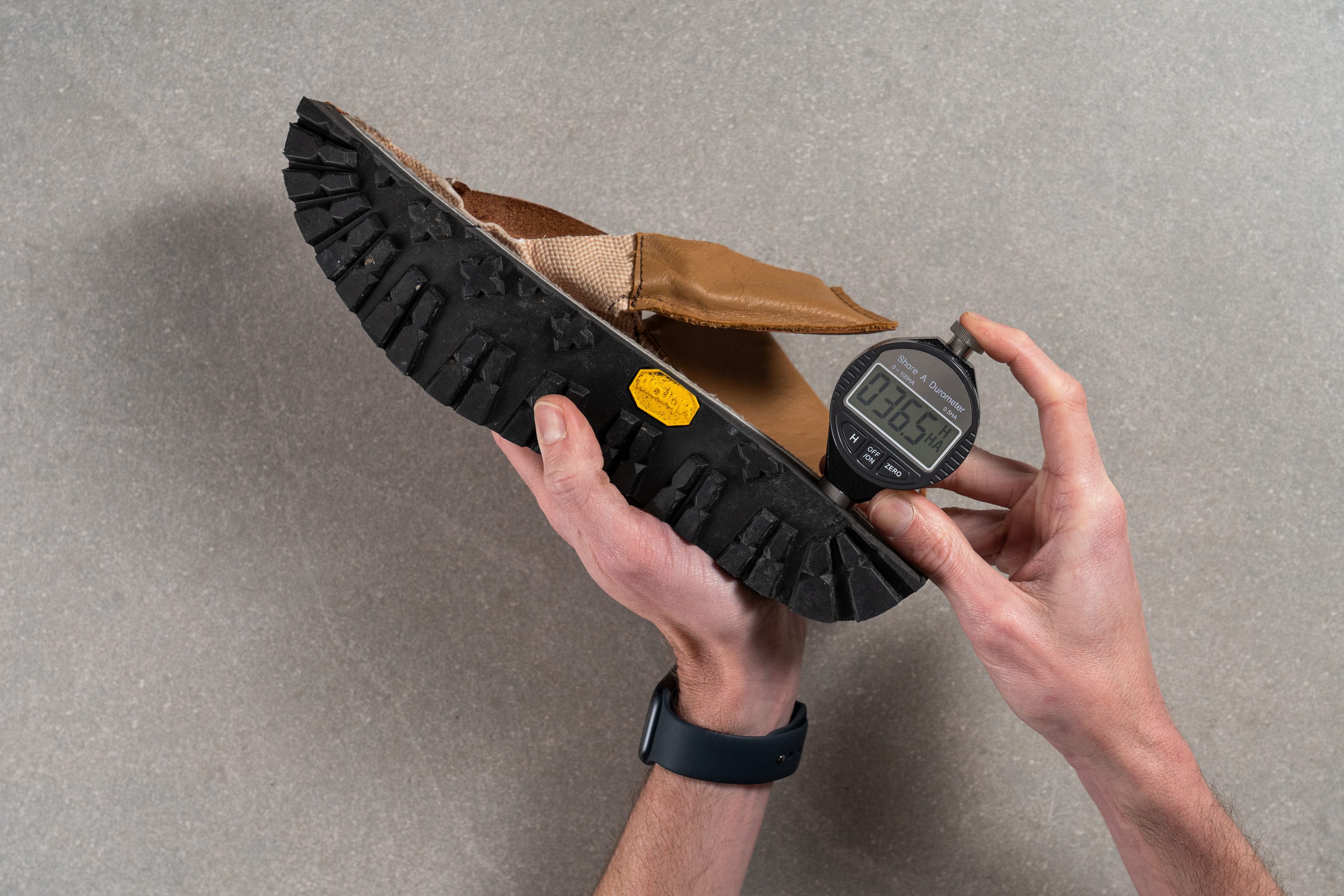
| Mountain Light | 36.6 HA |
| Average | 28.4 HA |
Size and fit
Size
Danner Mountain Light fits true to size (25 votes).
Internal length
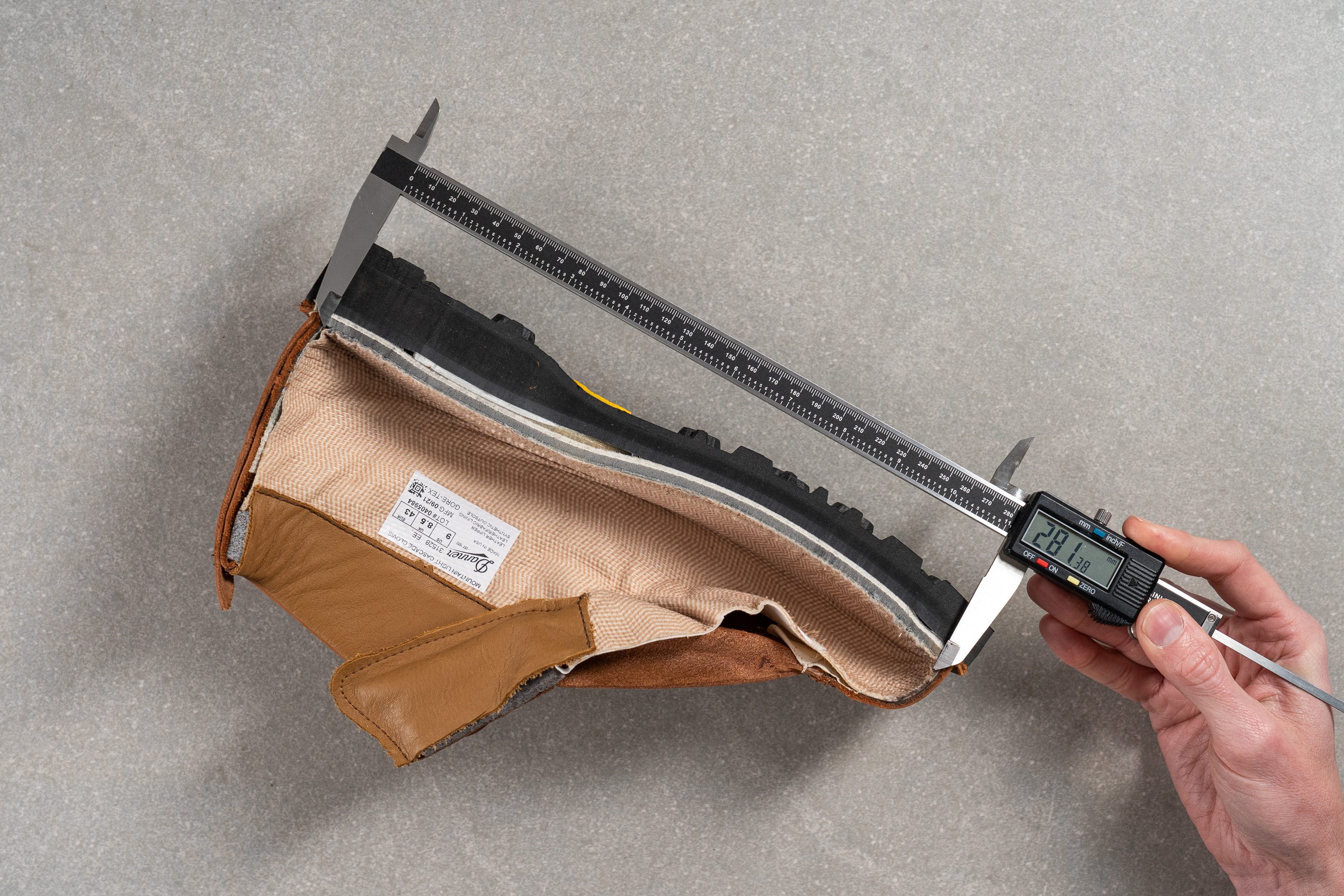
| Mountain Light | 281.4 mm |
| Average | 271.4 mm |
Width / Fit
Watch out! Because it is certainly NOT the "relaxed fit for casual, everyday wear" that Danner promises.
Having retrieved a gel mold of the boot's interiors, our caliper showed a notably narrow reading of 89.9 mm in its widest part. That's 4 millimeters narrower than the average hiking boot!
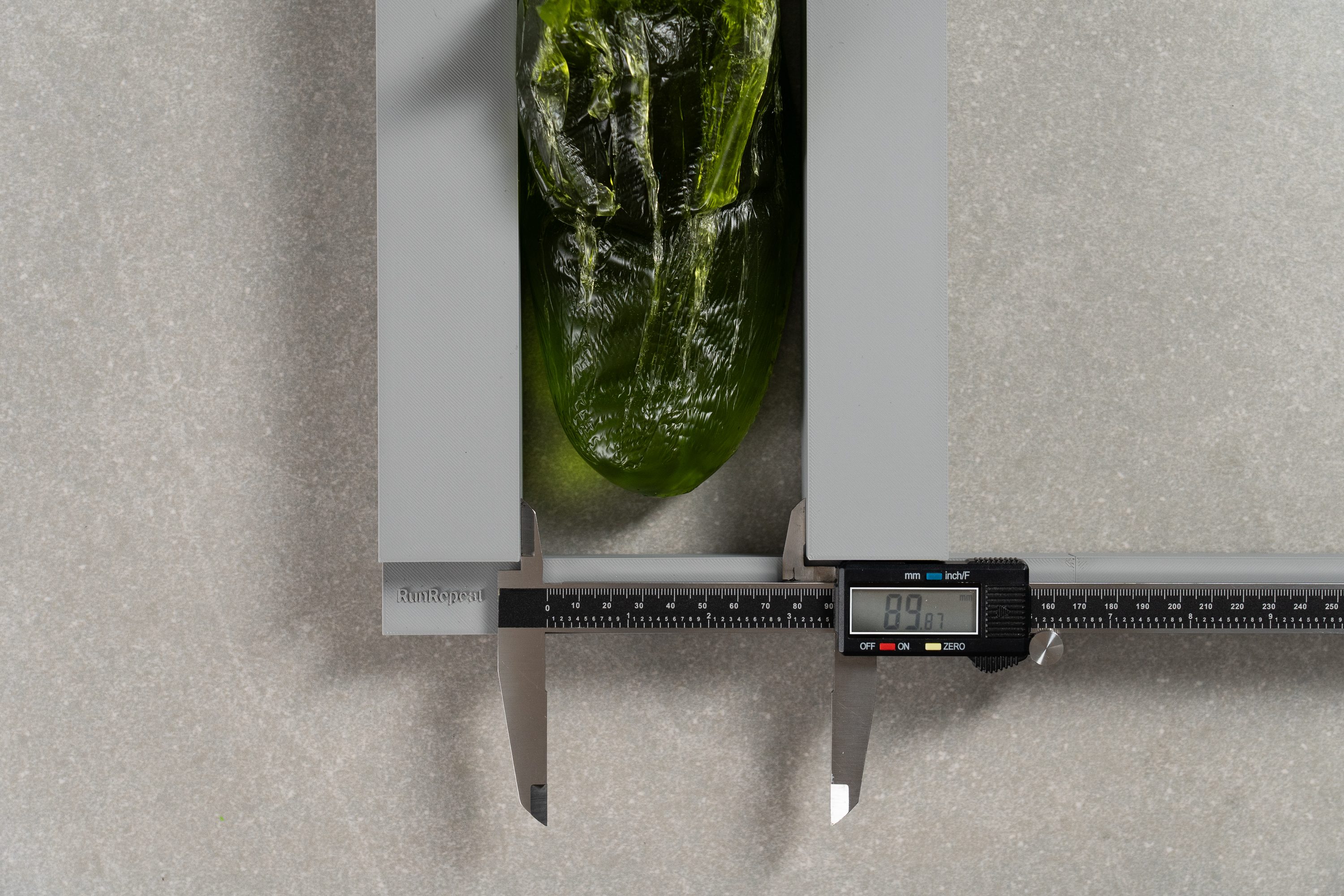
We were utterly taken aback by the boot's fit, given that the tested EE width is supposed to be wider than the standard width!
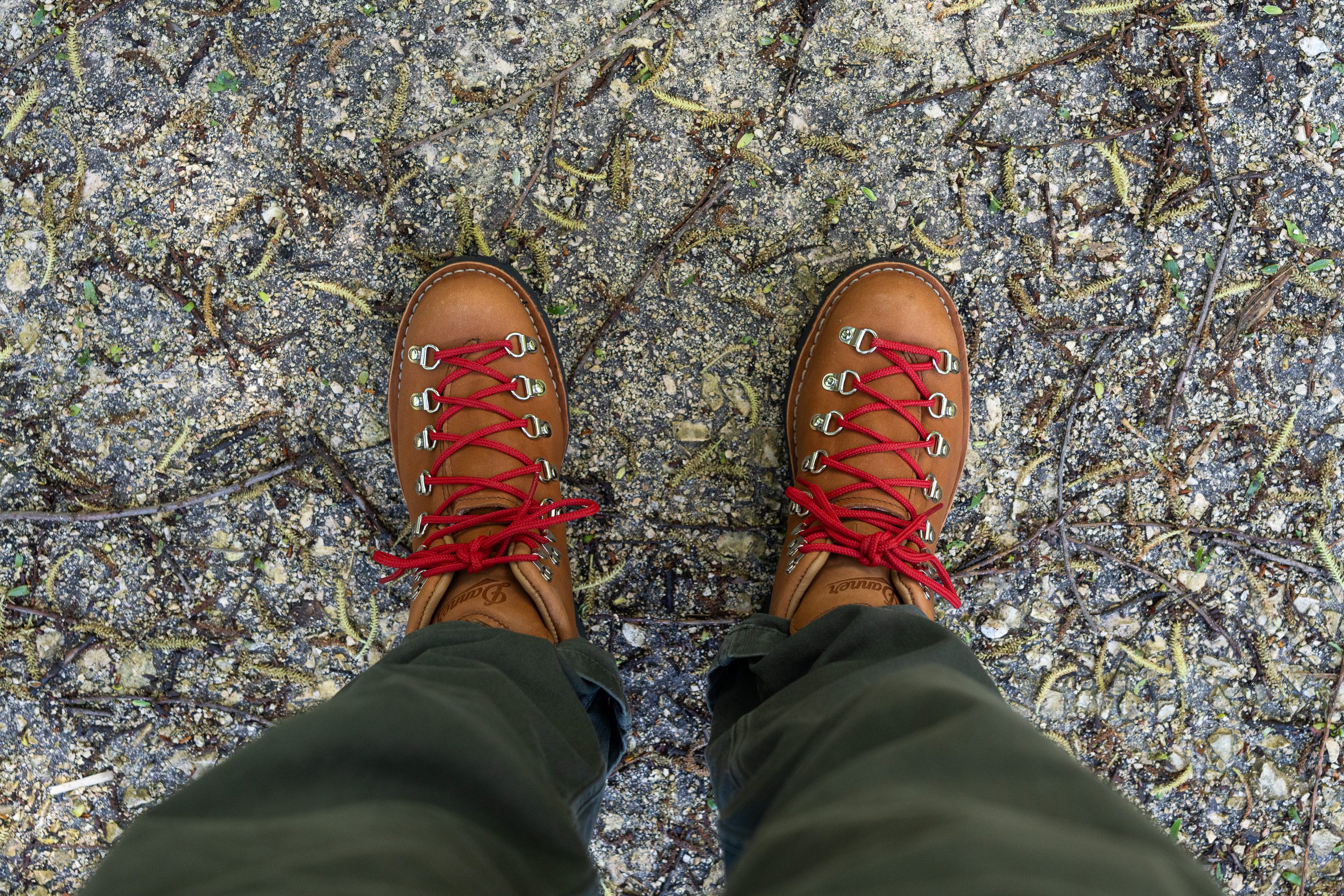
| Mountain Light | 89.9 mm |
| Average | 93.8 mm |
Toebox width
The boot's profile narrows even more drastically towards the toes. Measuring its width in the big toe area returned as little as 64.5 mm which is significantly narrower than average!
This Danner boot offered a very tight one-to-one fit for our medium-width feet. Definitely not recommended for wide footers. Consider the Danner Jag or the Danner Mountain 600 if you need an adequate medium-width space.
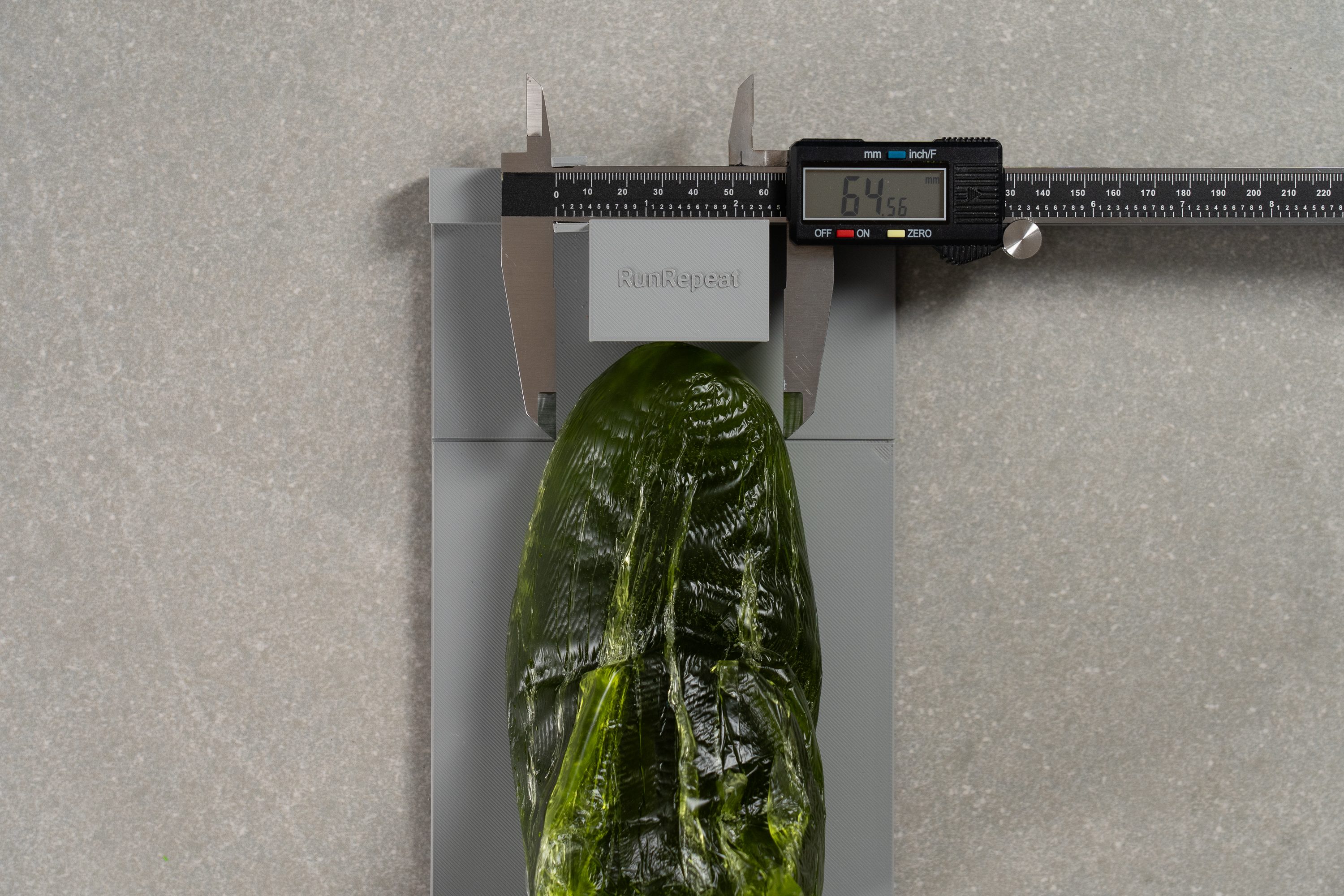
| Mountain Light | 64.5 mm |
| Average | 71.2 mm |
Toebox height
On a positive note, the toebox height of the Mountain Light is not as limited. It actually proved to be a couple of milimeters taller than average at 29.5 mm. But that doesn't really add much space.
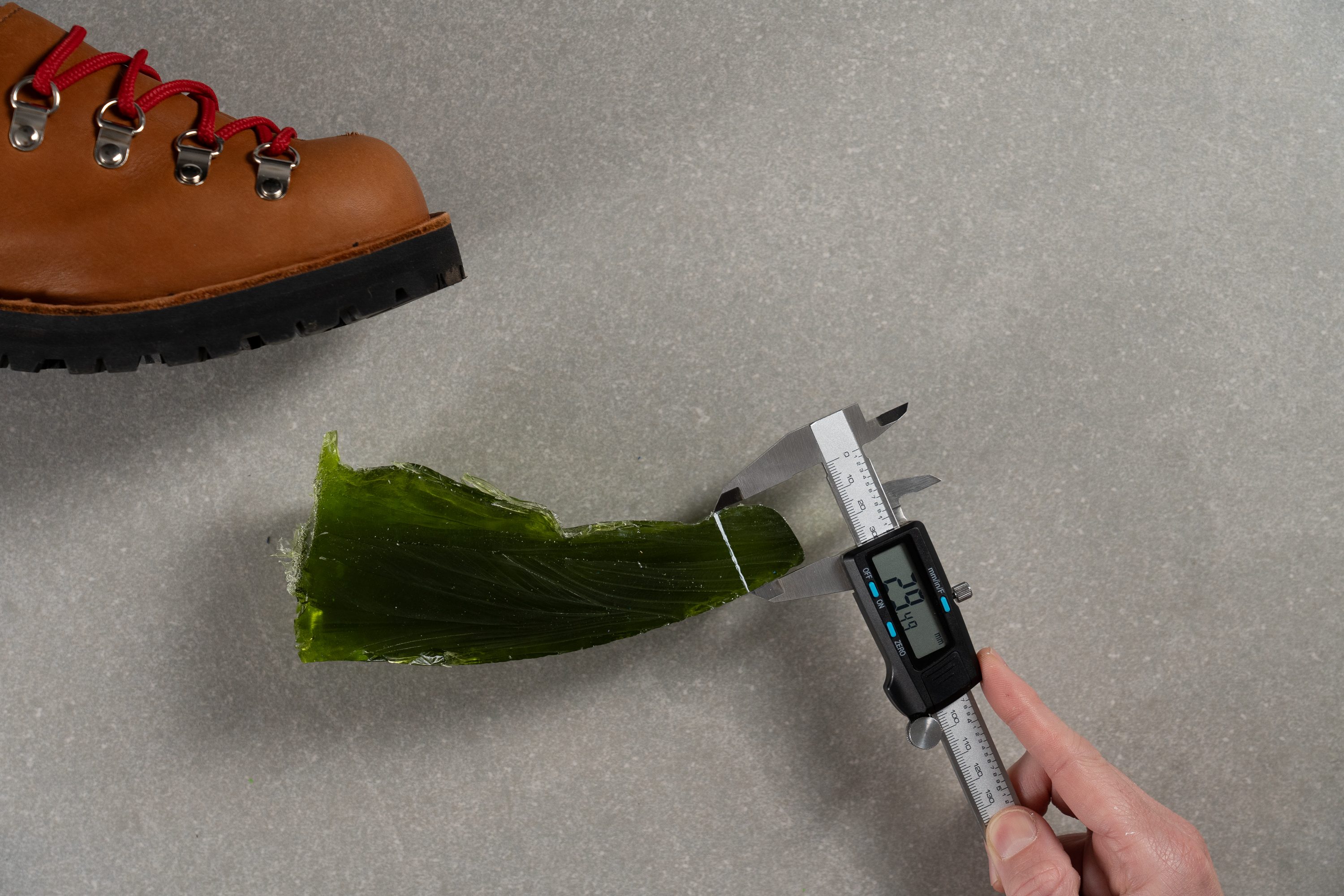
| Mountain Light | 29.5 mm |
| Average | 27.4 mm |
Traction / Grip
Lug depth
If you frequently hike in boggy and muddy areas or come across wet logs or slippery and moss-covered rocks, the Danner Mountain Light will be your best friend.
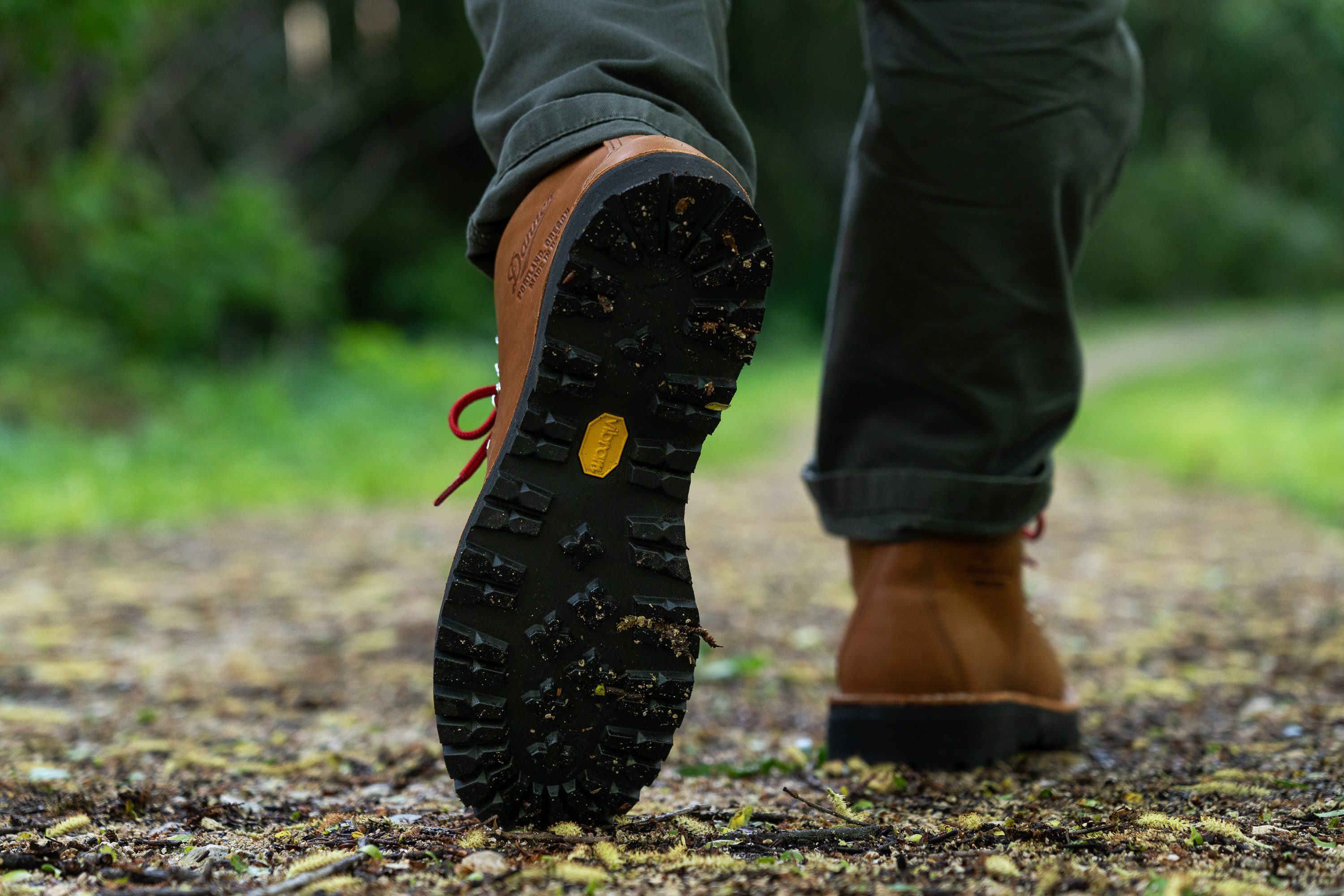
The gripping capacity of its Vibram Kletterlift outsole is exceptional! Measuring the boot's lug depth at 5.8 mm, we found them 1.5 mm toothier than average.
Paired with the boot's pronounced heel brake, we felt very secure going down steep slopes.
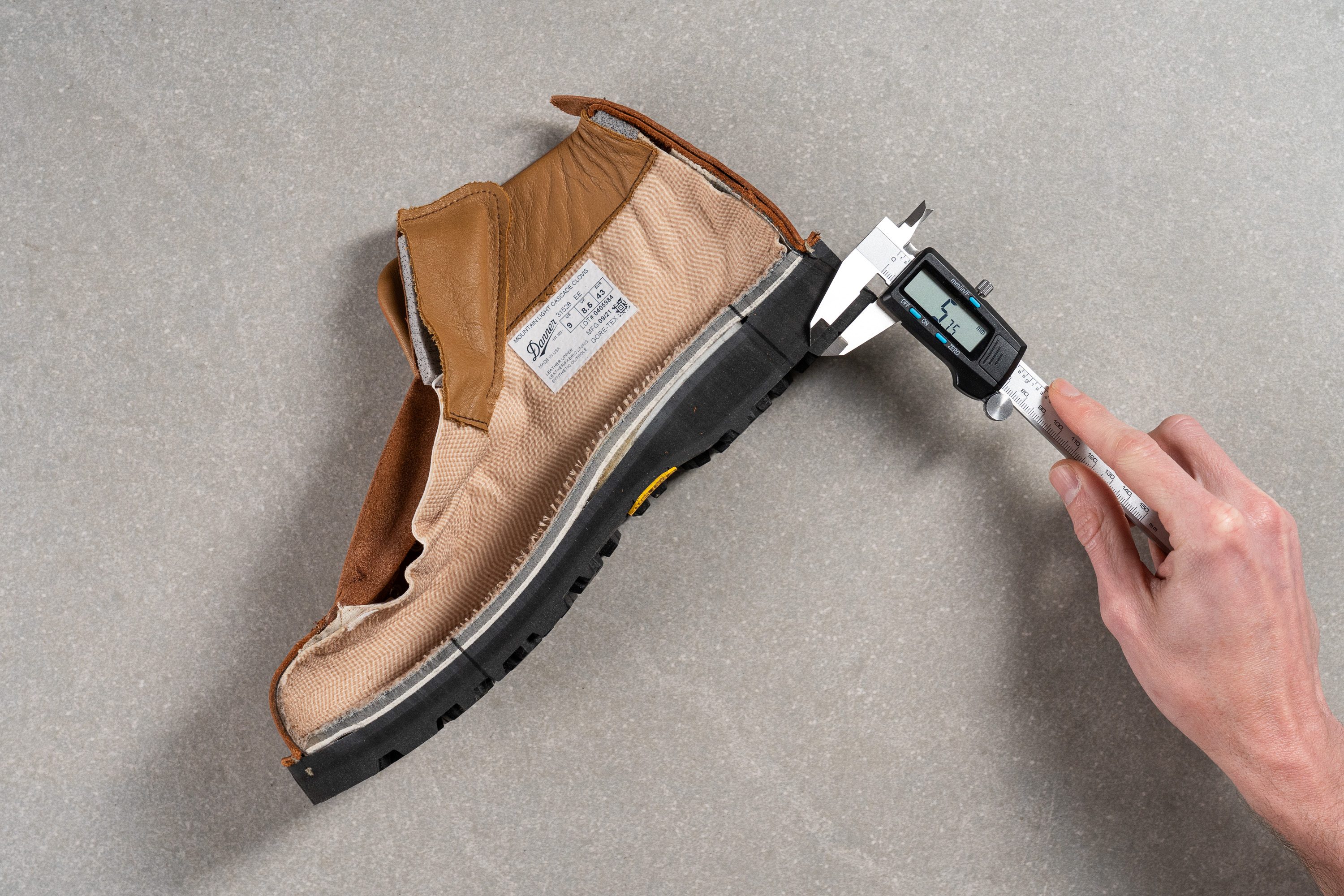
| Mountain Light | 5.8 mm |
| Average | 4.3 mm |
Flexibility / Stiffness
There is something you MUST know before you buy the Danner Mountain Light - this boot is unbendable! Especially in the first weeks of wearing it. The stiffness was so extreme that we could hardly bend our feet when hiking.
Using a shoe flexing tester, we measured how many newtons (N) it would take to bend the boot to a 30-degree angle. At 43.5N, it required significantly more force to flex it compared to an average hiking boot. It also proved to be the stiffest among all the Danner boots we've tested.
However, such rigidity has its benefits if you are looking for a highly stable and supportive ride that minimizes foot flexion on uneven terrain and doesn't let it buckle either.
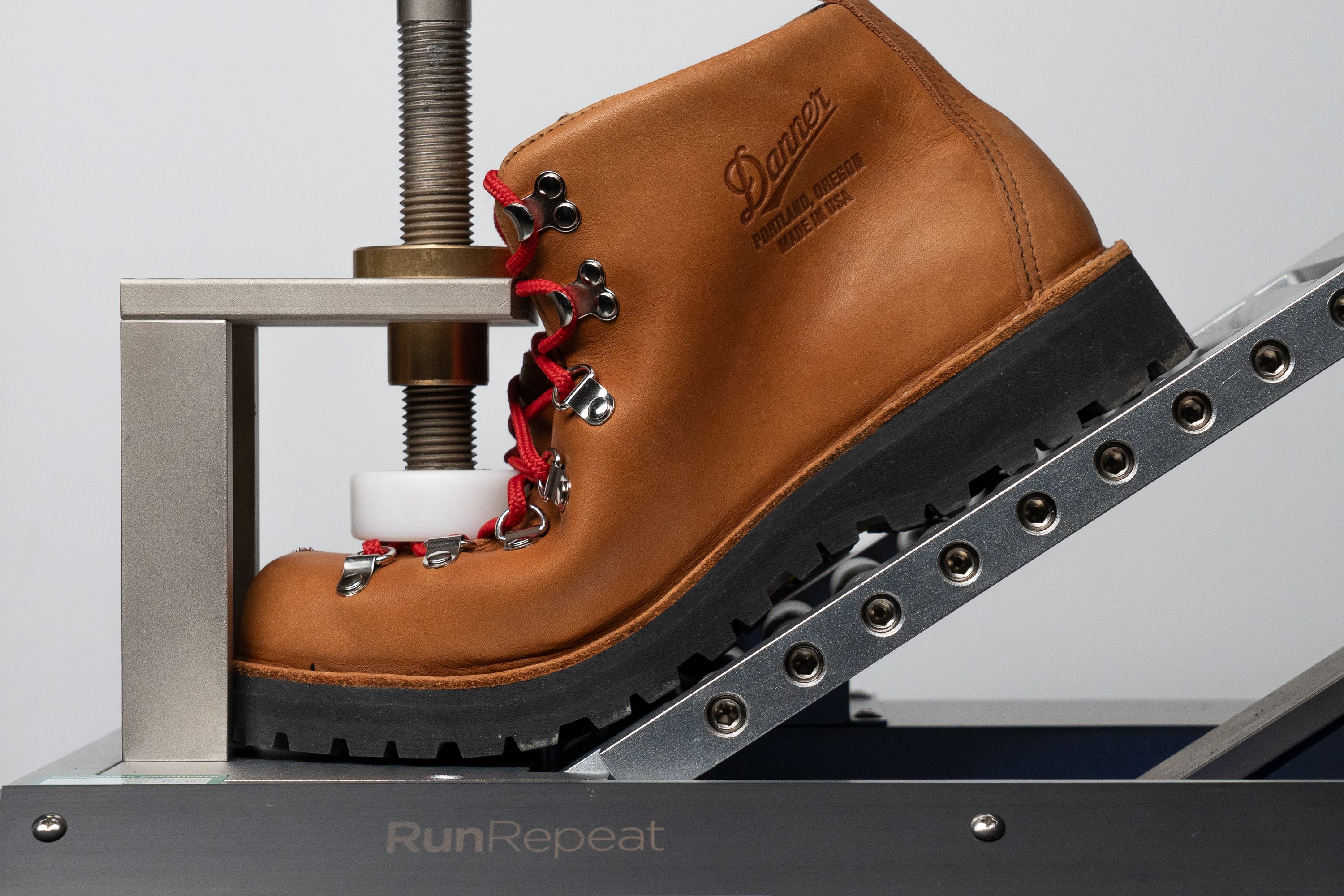
| Mountain Light | 43.5N |
| Average | 31.5N |
Weight
Don't be misled by the word "Light" in its name. This Danner boot has nothing to do with being light!
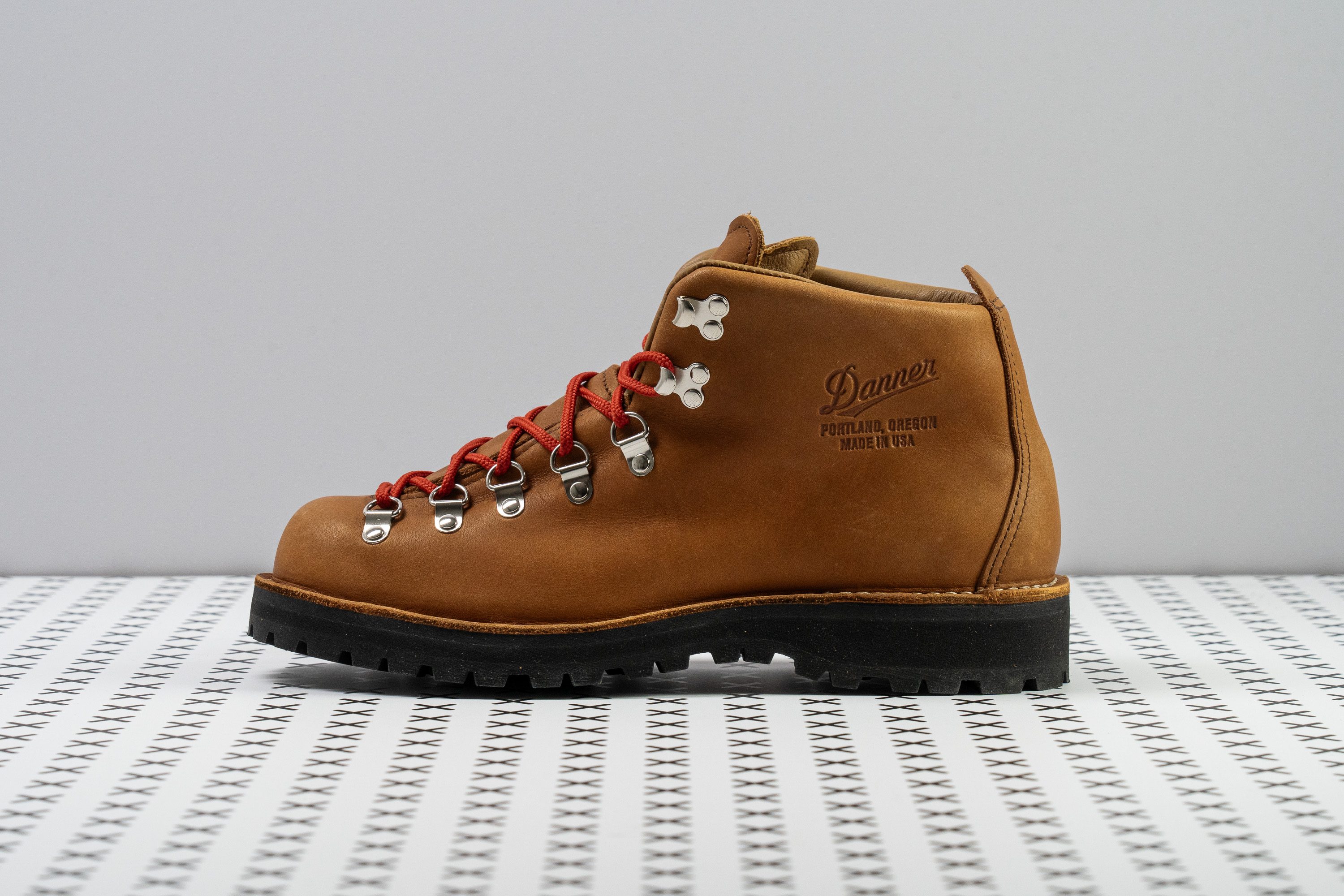
It is a MASSIVE boot weighing 28.3 oz (802g) in a men's US size 9! That's a mind-blowing 10 oz (283g) heavier than average and is the heaviest hiking boot we've ever tested.
If you are packing a heavy backpack, keep in mind that you will need to drag these monsters around as well.
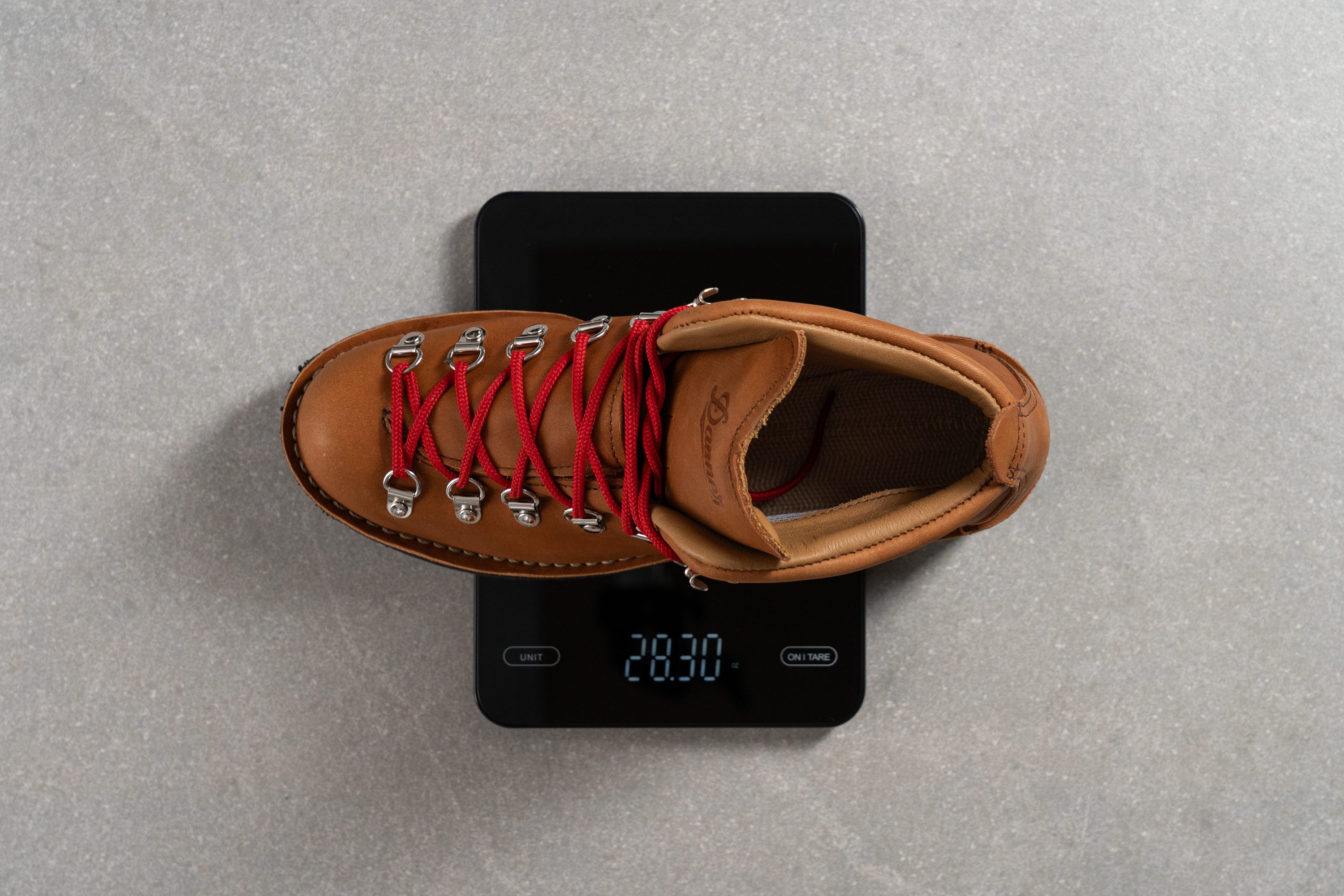
| Mountain Light | 28.3 oz (802g) |
| Average | 18.7 oz (531g) |
Breathability
The Danner Mountain Light is available in two options:
- non-waterproof with a breathable Dri-Lex lining ($430)
- waterproof with a Gore-Tex (GTX) lining ($440)
But even the Dri-Lex version has some waterproofing capacity given the boot's one-piece leather upper design. In this review, we are testing the waterproof GTX version of the boot.
Putting the Mountain Light on for the first time, we immediately knew that it was going to be a fall/winter boot. Our feet felt toasty a mere 10 minutes into the hike in mildly warm weather. So, we weren't at all surprised when no smoke passed through its sturdy upper in our lab test.
Rating the boot's breathability on a 1-5 scale, it obviously got the lowest score of 1.
| Mountain Light | 1 |
| Average | 1.3 |
Waterproofing
Testing the Mountain Light in creeks and heavy rain, we were amazed by its ability to keep water at bay. Even when we got caught in a sudden thunderstorm, this Danner boot kept our feet nice and dry.
We can also recommend this boot for very wet and snowy climates.
WARNING: Avoid stepping into ankle-deep puddles in this boot! As you can see from the video above, its tongue is not attached to the entire length of the collar. The gap starts right over the last D-ring eyelet so that's where the water will start seeping inside the boot.
And trust us, once the water is inside, you won't have fun wearing the boot anymore.
Stability
Lateral stability test
The Danner Mountain Light feels incredibly supportive and stable.
Walking on uneven terrain and oddly shaped boulders, we never lost our footing or felt off-balance. The side-to-side containment and lockdown are truly off the charts in this Danner boot.
Torsional rigidity
The boot's thick and sturdy sole, stiff leather upper, and Fiberglass midfoot shank all work together to create a highly stable platform.
Our attempt to twist the Mountain Light with our bare hands was unsuccessful, to say the least. On a 1-5 stiffness scale, we rated its torsional rigidity with the highest possible score of 5.
Ankle twists are simply not part of this boot's vocabulary.
| Mountain Light | 5 |
| Average | 4.4 |
Heel counter stiffness
The boot's solid heel counter further locked our feet down by locking our heels and ankles in place.
Testing the boot's hee stiffness in our manual test, we felt a bit of squeeze on the sides but there was not a hint of bending at the back of the boot.
Even though we rated the boot's heel counter stiffness with a moderate 3 out of 5, it never gave us a sense of undue ankle shifting.
| Mountain Light | 3 |
| Average | 3.6 |
Midsole width - forefoot
Danner went for a moderately wide platform in the Mountain Light.
Measuring the widest part of its forefoot, we got 110.6 mm which is very close to the average. We never felt as though the platform was lacking in width though.
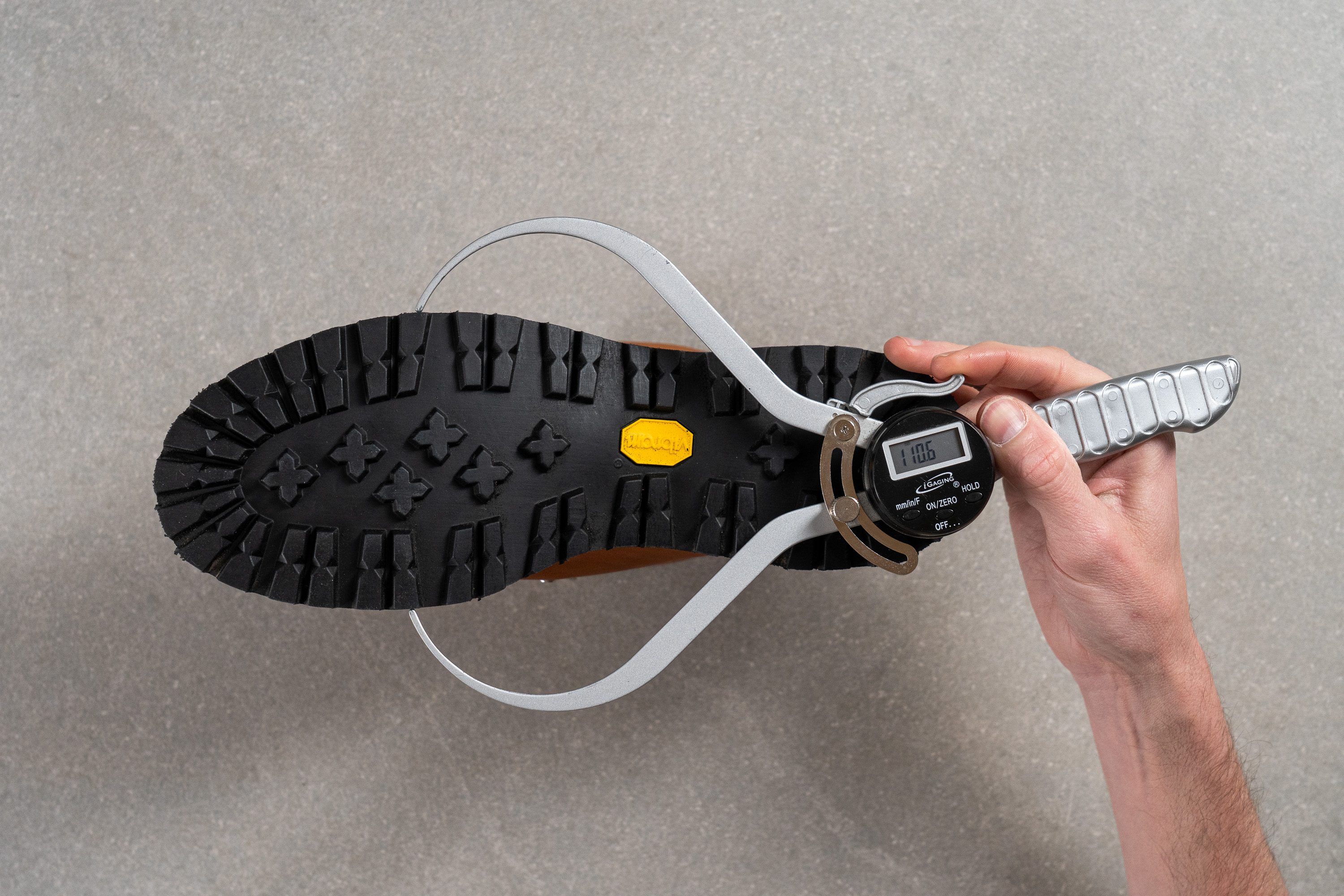
| Mountain Light | 110.6 mm |
| Average | 111.5 mm |
Midsole width - heel
The situation is similar in the heel. Our caliper showed 86.7 mm in the widest part of the platform which is a mere 1-2 mm narrower than average.
If you want a wider Danner boot, try the Mountain 600. It measured 91.2 mm in the widest part of the heel.
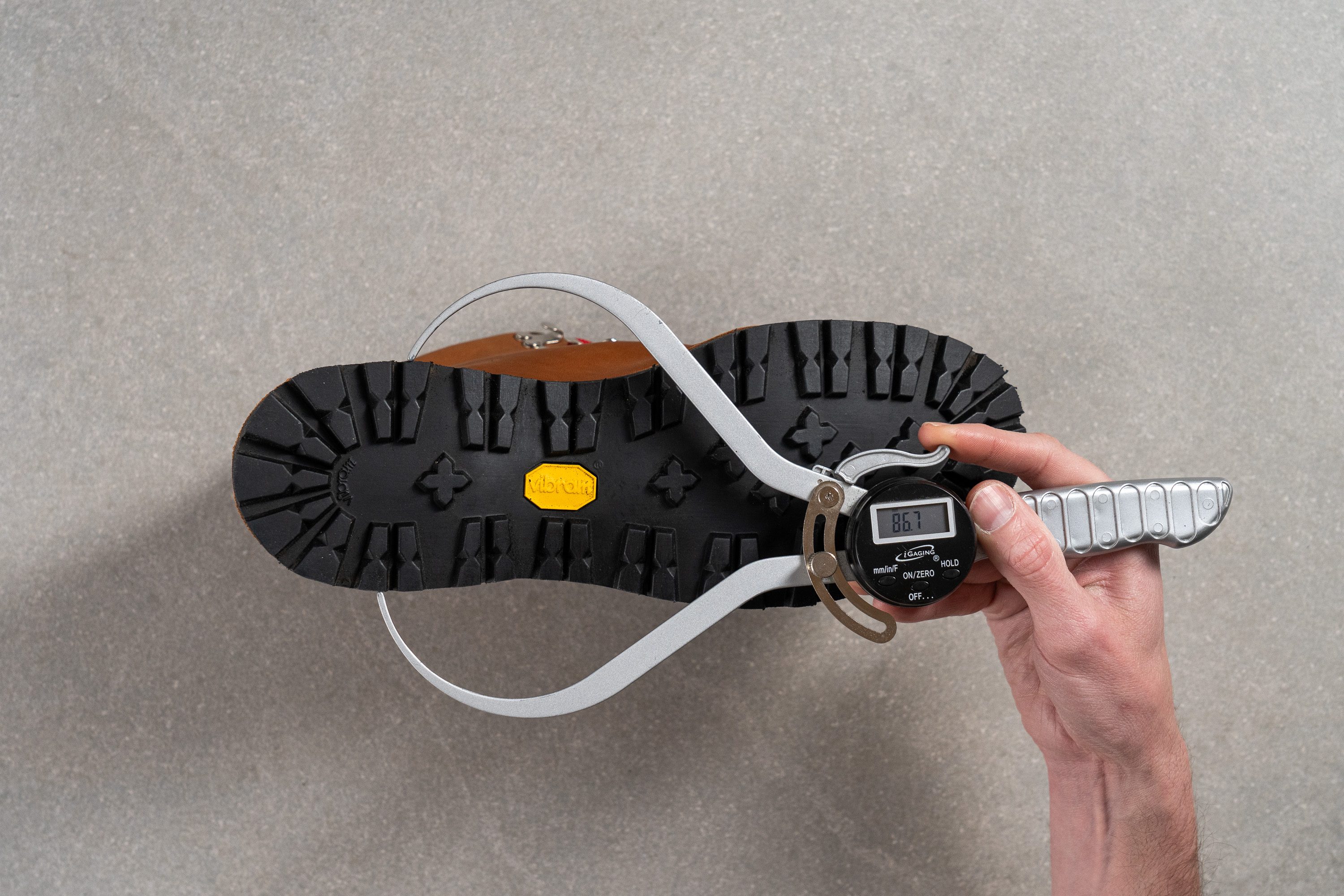
| Mountain Light | 86.7 mm |
| Average | 87.6 mm |
Durability
Toebox durability
Every pair of the Danner Mountain Light is proudly made by hand in Portland, Oregon (USA). This is a huge part of the brand's marketing campaign for the quality of its footwear.
Having tested the boot in our lab, we can subscribe to the claims.
We are obsessed with the fine craftsmanship of the Danner Mountain Light. Its upper construction and leather quality are nothing short of flawless.
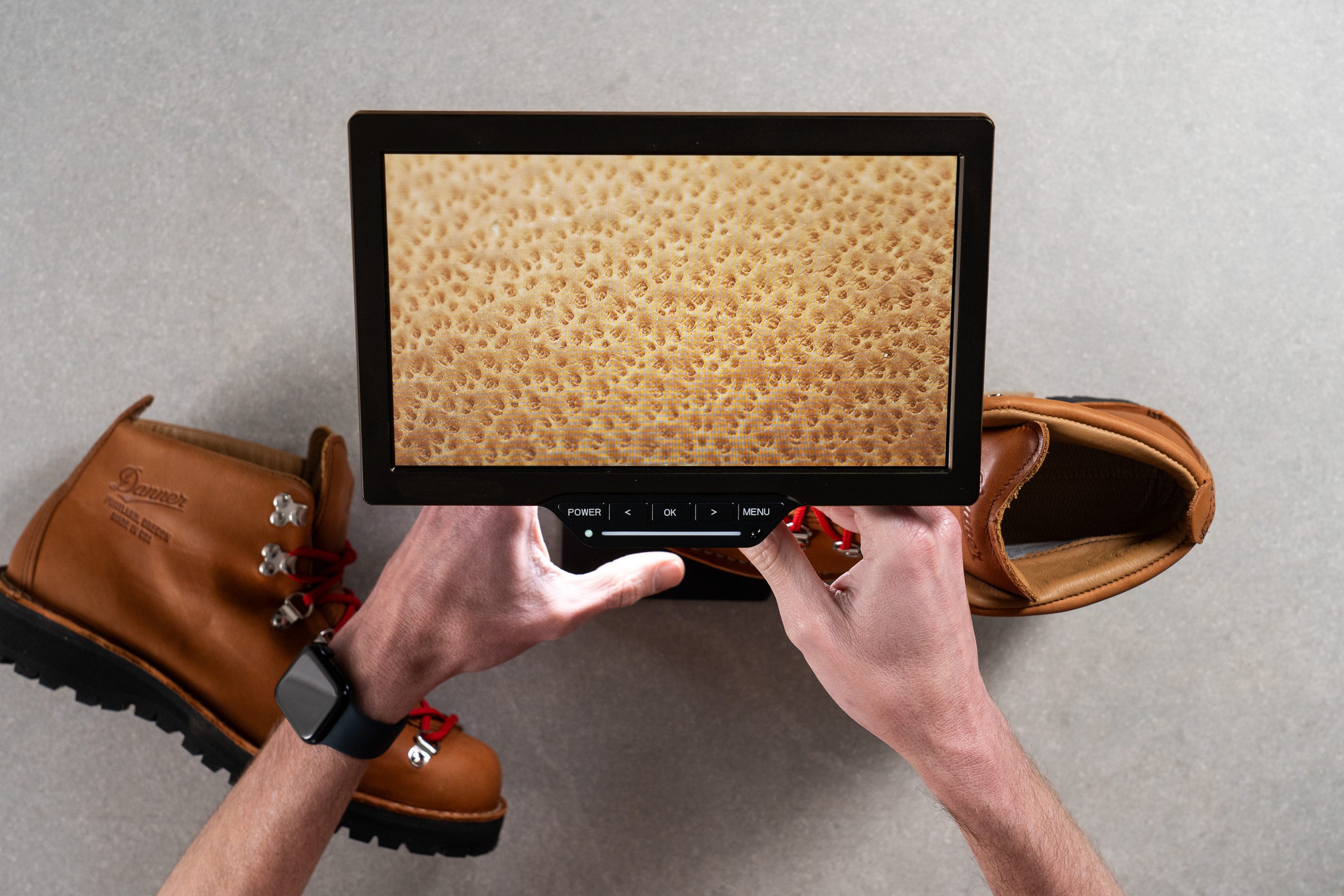
Just look at that beautiful full-grain leather through the lens of our microscope!
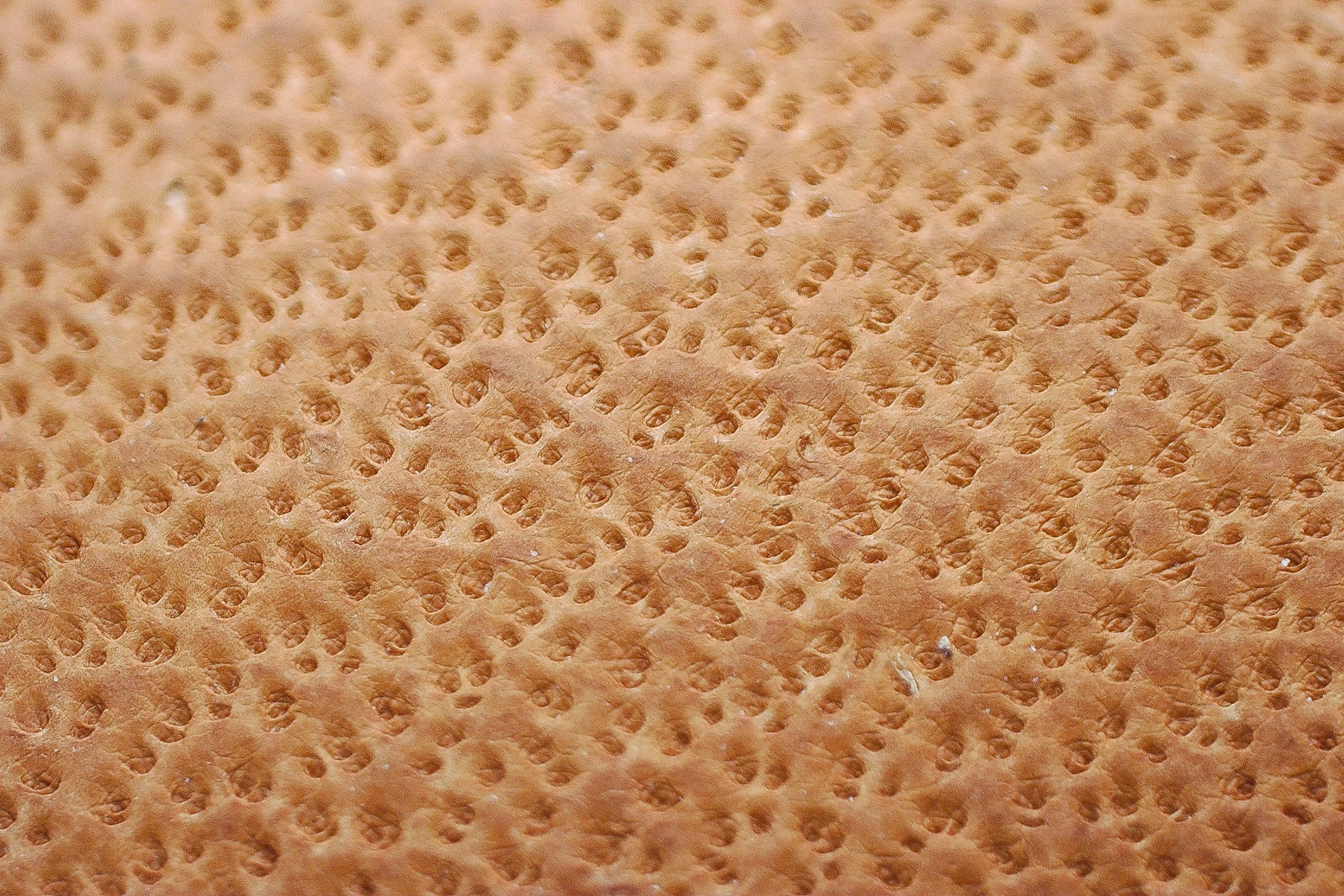
To mimic the wear and tear of hiking, we drilled the boot's toebox with high-grit sandpaper. For consistency, the speed of the Dremel was set to 5K RPM and the pressure was at 3.2N. After 12 seconds of applying the tool to the leather, it left nothing more than a scuff!
Compared to other hiking boots in our lab, the damage on the Danner Mountain Light was minuscule!
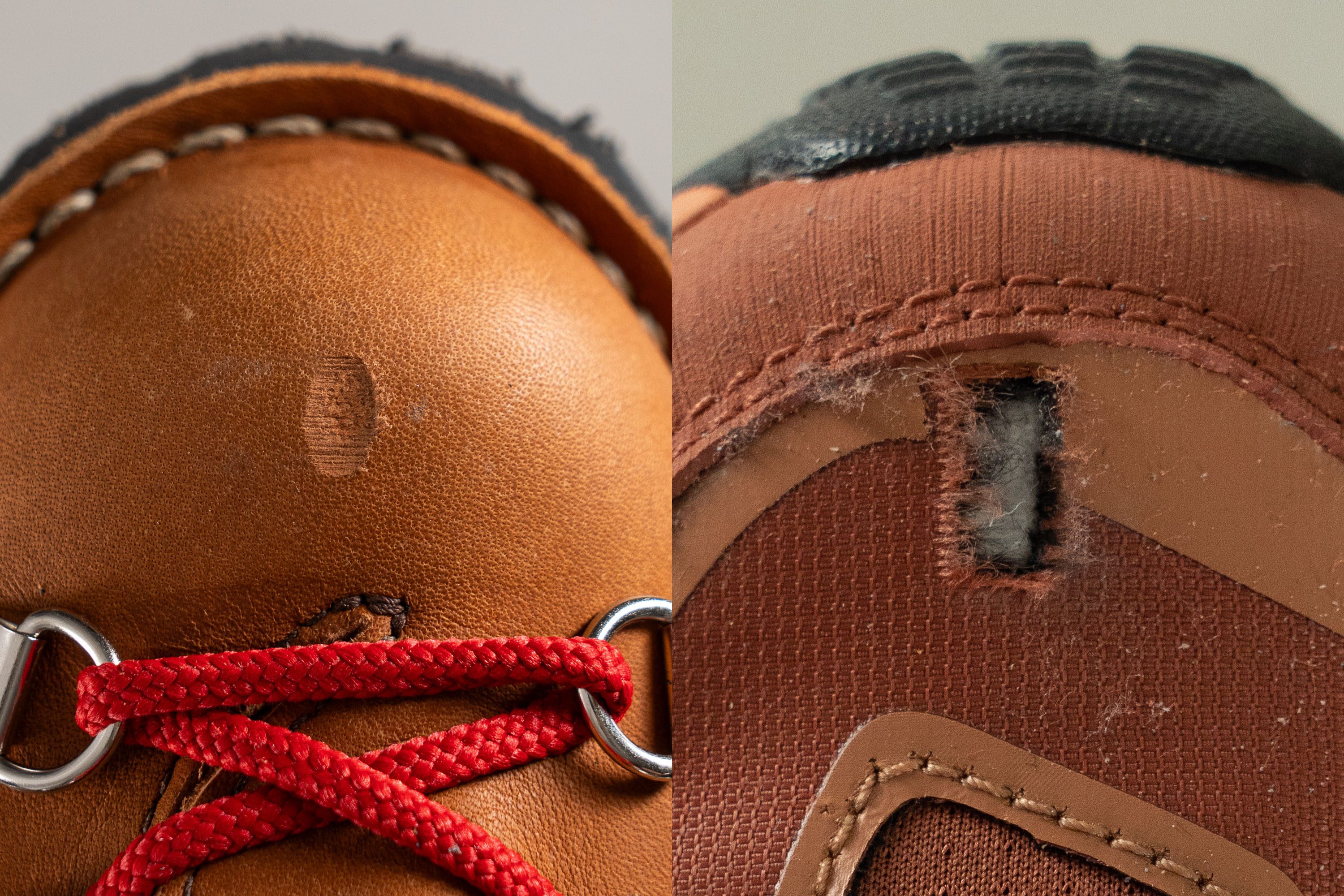
In the comparison photo above, it is easy to see its toebox durability deserves the highest durability score - 5 out of 5!
It makes us believe that Danner actually puts leather through six different tests before approving it for production.
| Mountain Light | 5 |
| Average | 4.3 |
Heel padding durability
The Danner boot proved its quality once again in our heel padding durability test. The topmost layer of its collar is lined with softer yet durable leather too.
We subjected this part of the boot to the familiar Dremel test and found that undercuts many other boots in our roster. With barely visible signs of wear, the Mountain Light gets a well-deserved 5 out of 5 for heel padding durability.
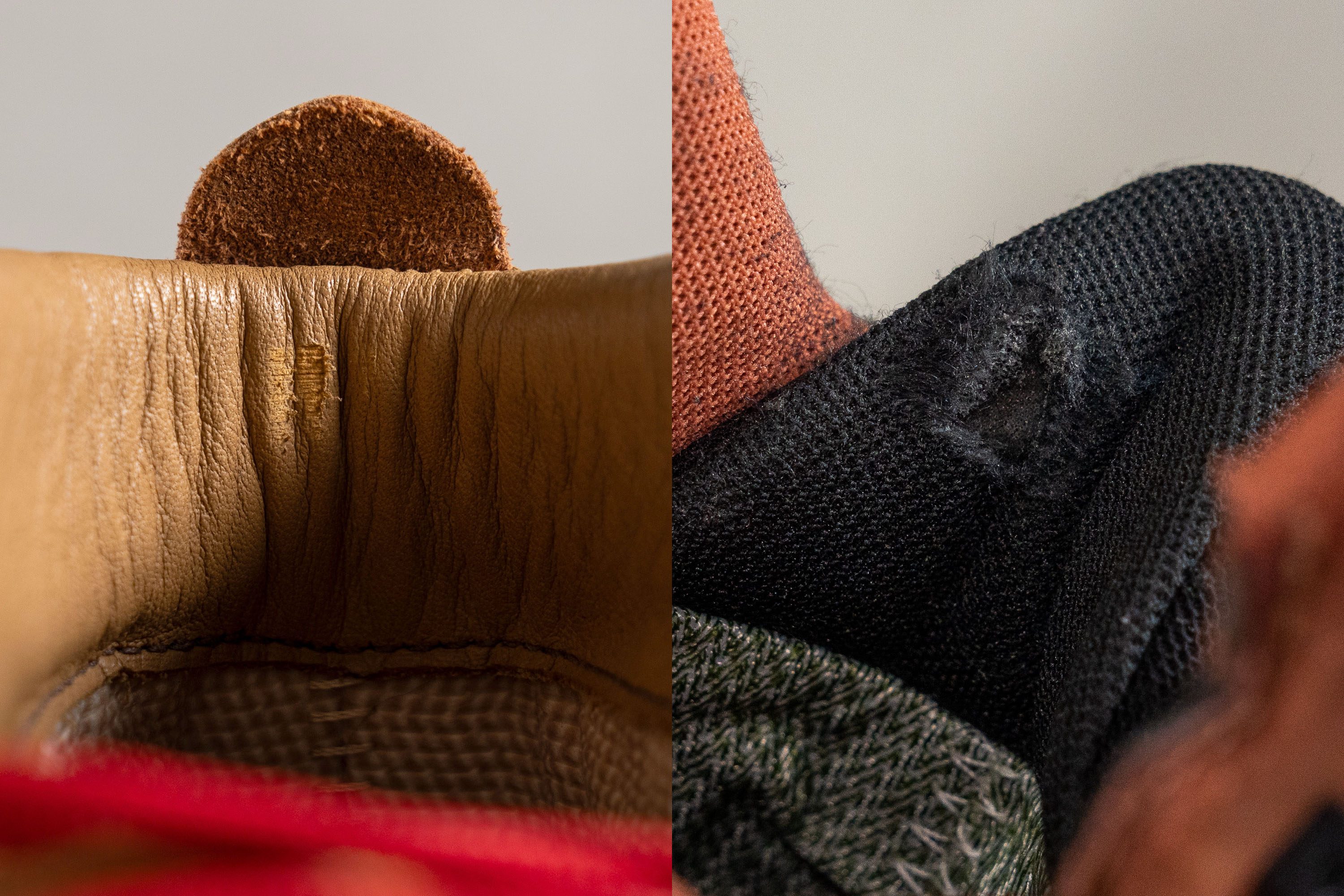
| Mountain Light | 5 |
| Average | 3.6 |
Outsole hardness
Another outstanding characteristic of the Danner Mountain Light is, of course, its outsole durability. Choosing Vibram rubber for its outsole, the boot showed higher-than-average results in all three of our measurements.
First of all, it is harder than most hiking boot rubbers. With a durometer measurement of 91.6 HC, it beats 85% of our lab-tested boots.
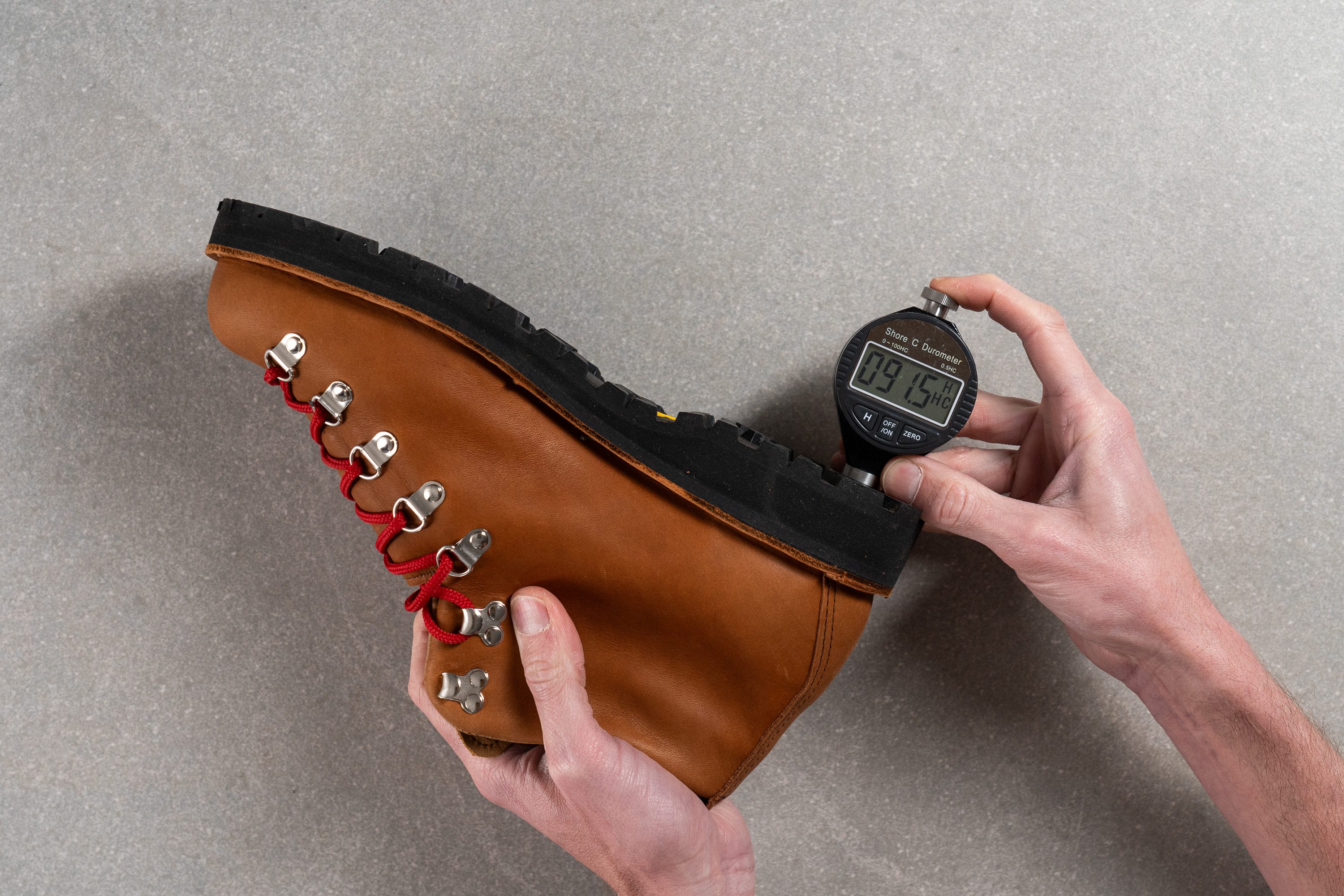
| Mountain Light | 91.6 HC |
| Average | 87.1 HC |
Outsole durability
The boot's Vibram outsole continued to show amazing results in our vigorous Dremel test. This time, our tool was set to 10K RPM speed and drilled the rubber for 22 seconds.
Once done, we measured the newly formed dent with a tread gauge and saw only 0.7 mm of depth! Less than a millimeter of damage is a fantastic result for a hiking boot.
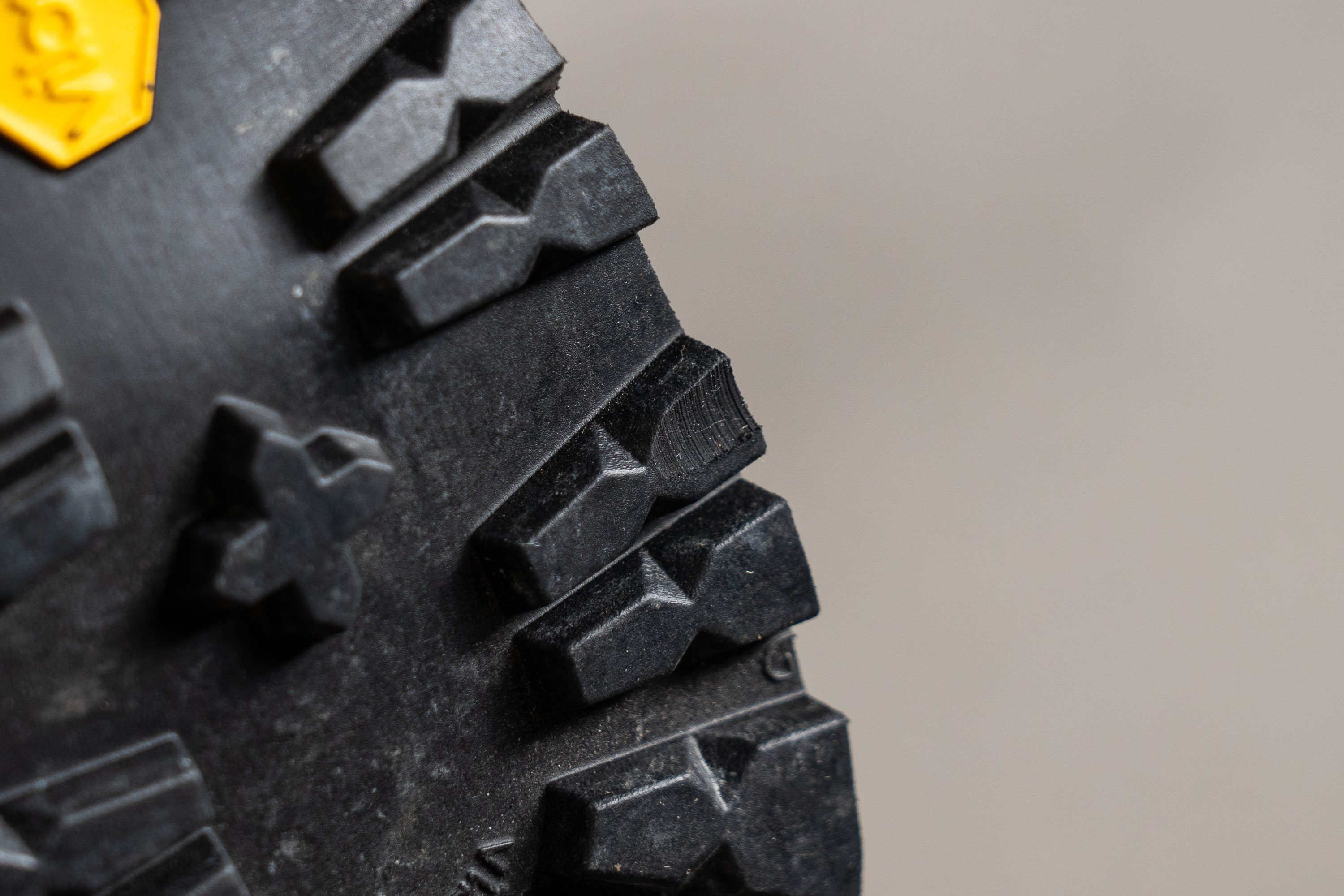
| Mountain Light | 0.7 mm |
| Average | 0.8 mm |
Outsole thickness
On top of it all, the Mountain Light's outsole showed a massive thickness of 4.8 mm! This is one of the thickest we've seen in hiking boots.
We are convinced that the outsole of this Danner boot will take longer to wear out, even if it's regularly used on rocky terrain.
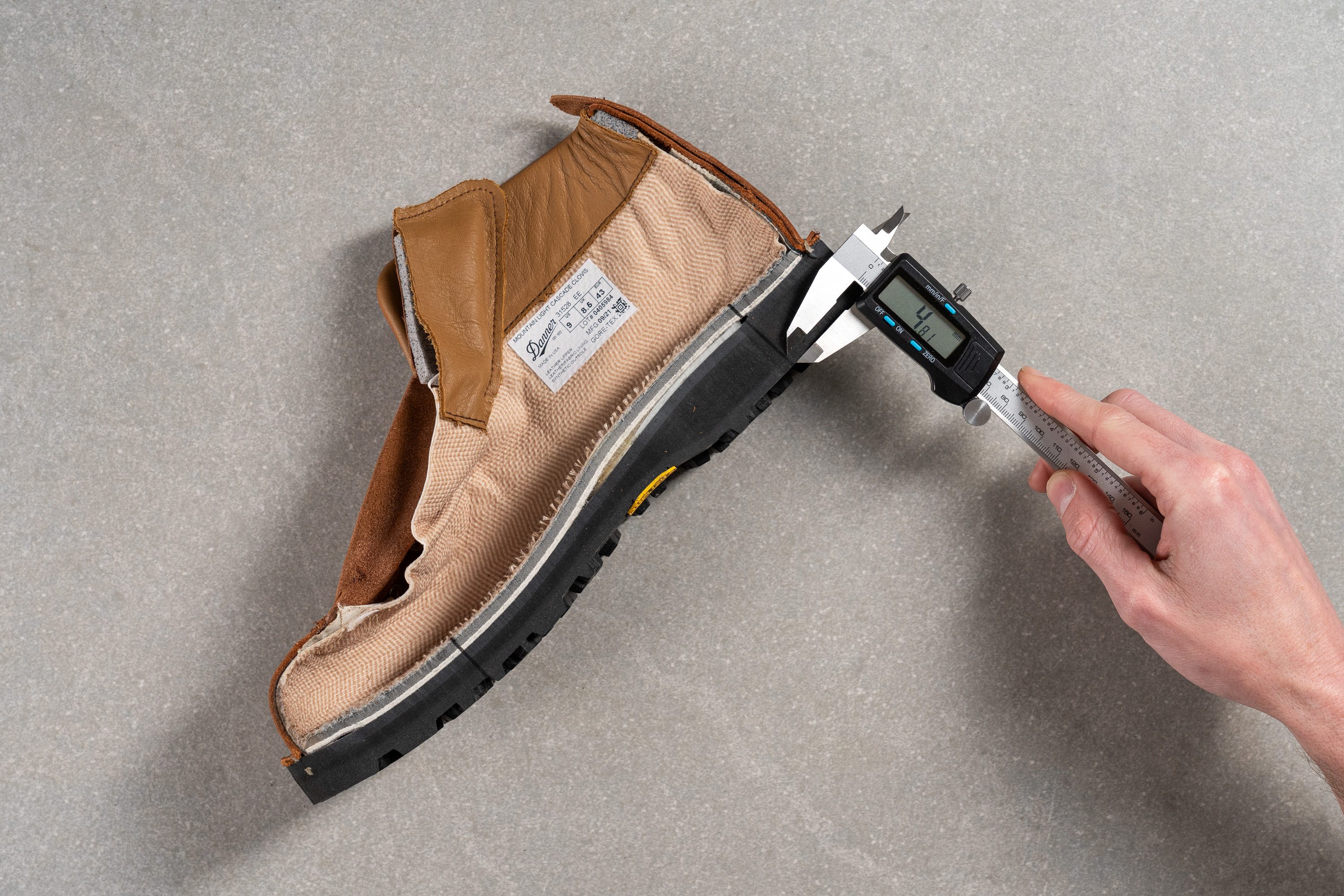
| Mountain Light | 4.8 mm |
| Average | 2.9 mm |
Recrafting
The Mountain Light uses Danner's signature stitch-down construction which makes it easier to resole and recraft.
The stitching connects the boot's leather upper to the sole externally which makes it easier to unpick and re-sew to a new sole.
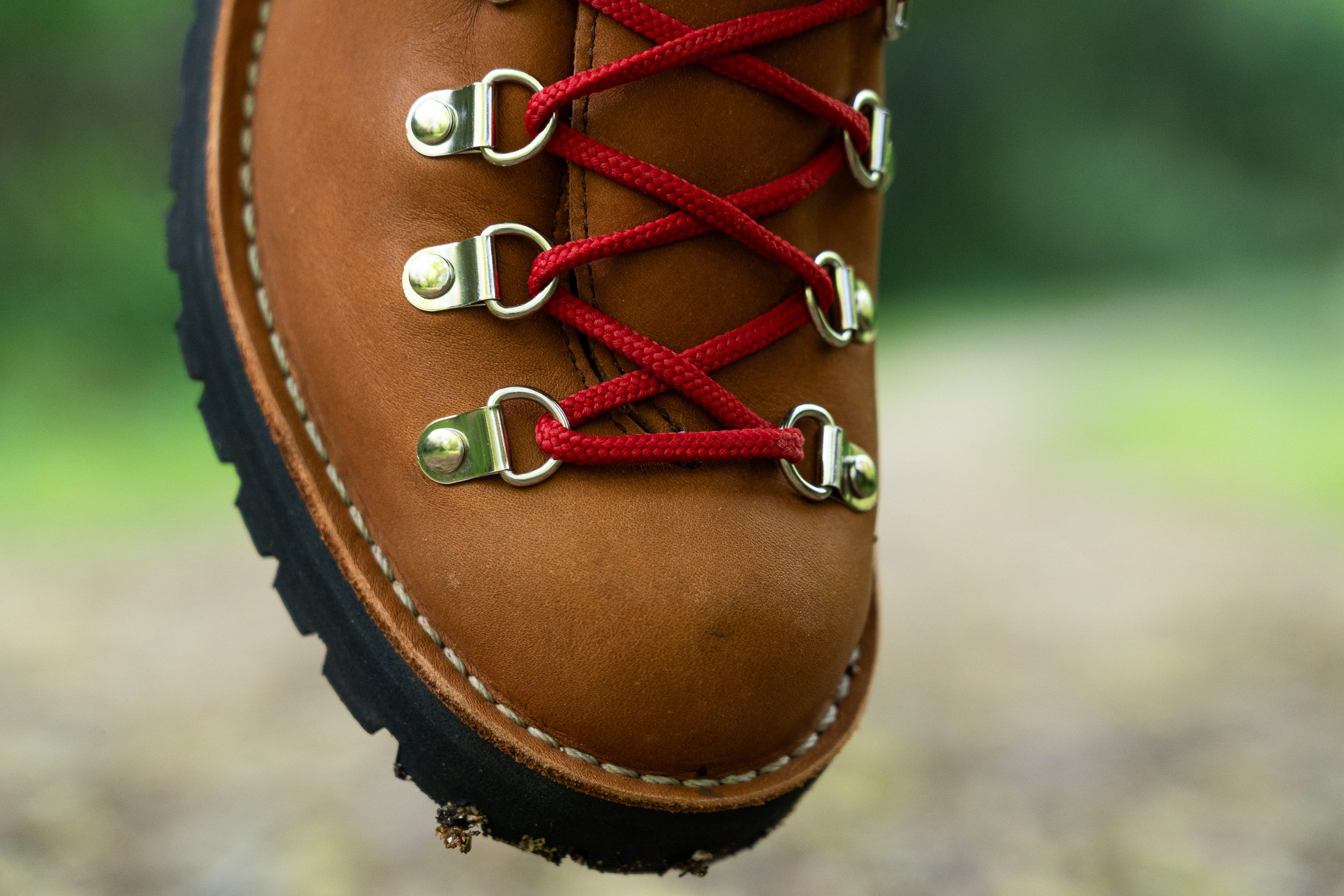
The brand makes it clear on its official website that recrafting services are available for its boots.
Misc
Insole thickness
The hardness of the boot's platform wasn't so apparent to us thanks to the well-padded insole on top of it. Measuring its thickness with a caliper, we got 8.0 mm.
Thicker than average, the insole proved to be enough of a buffer to keep our feet comfy inside the Mountain Light.
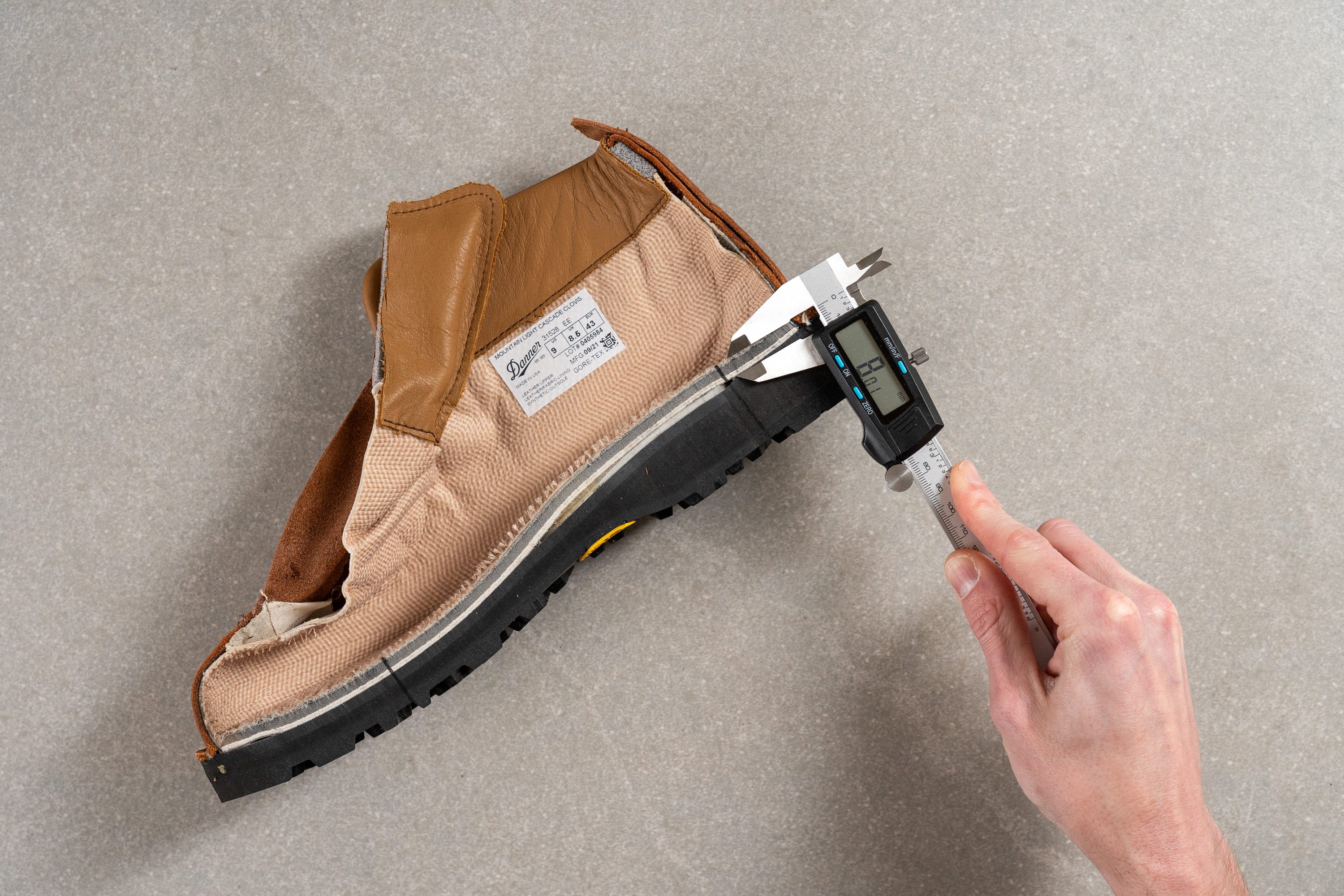
| Mountain Light | 8.0 mm |
| Average | 6.0 mm |
Removable insole
The insole is NOT removable in the Danner Mountain Light. And we wouldn't recommend adding in orthotic on top of it because the boot's fit is rather narrow already.
| Mountain Light | No |
Midsole softness in cold (%)
We can confidently recommend the Danner Mountain Light for the cold season. This is not only because of its warm upper but also because its cushioning barely changes in low temperatures.
After keeping the boot in the freezer for 20 minutes, we measured its foam softness once again. At 39.9 HA, it only firmed up by 8.9%! For reference, boots with cushier foams normally get 20% harder.
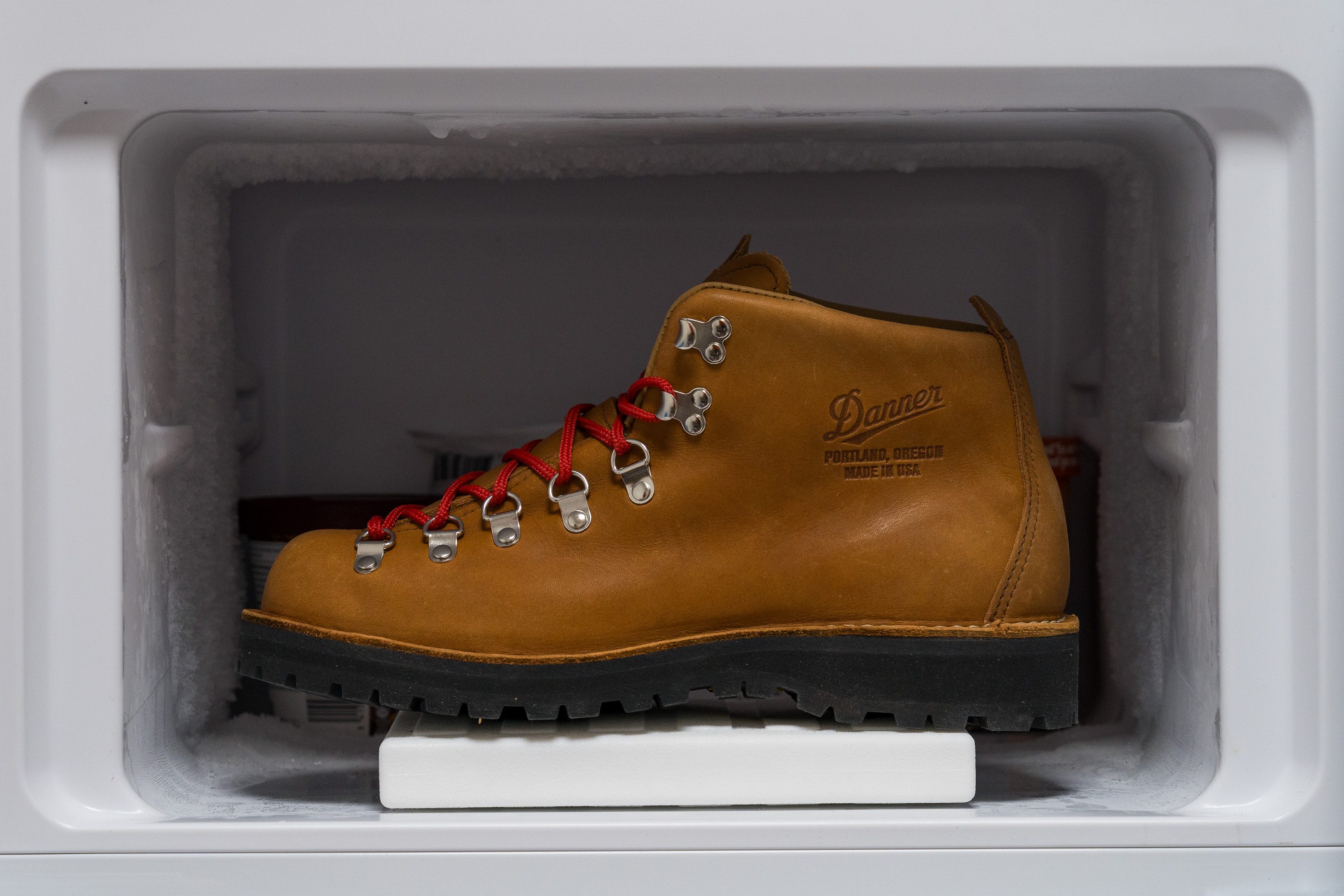
| Mountain Light | 9% |
| Average | 20% |
Reflective elements
With its one-piece leather upper, the Mountain Light has no reflective elements.
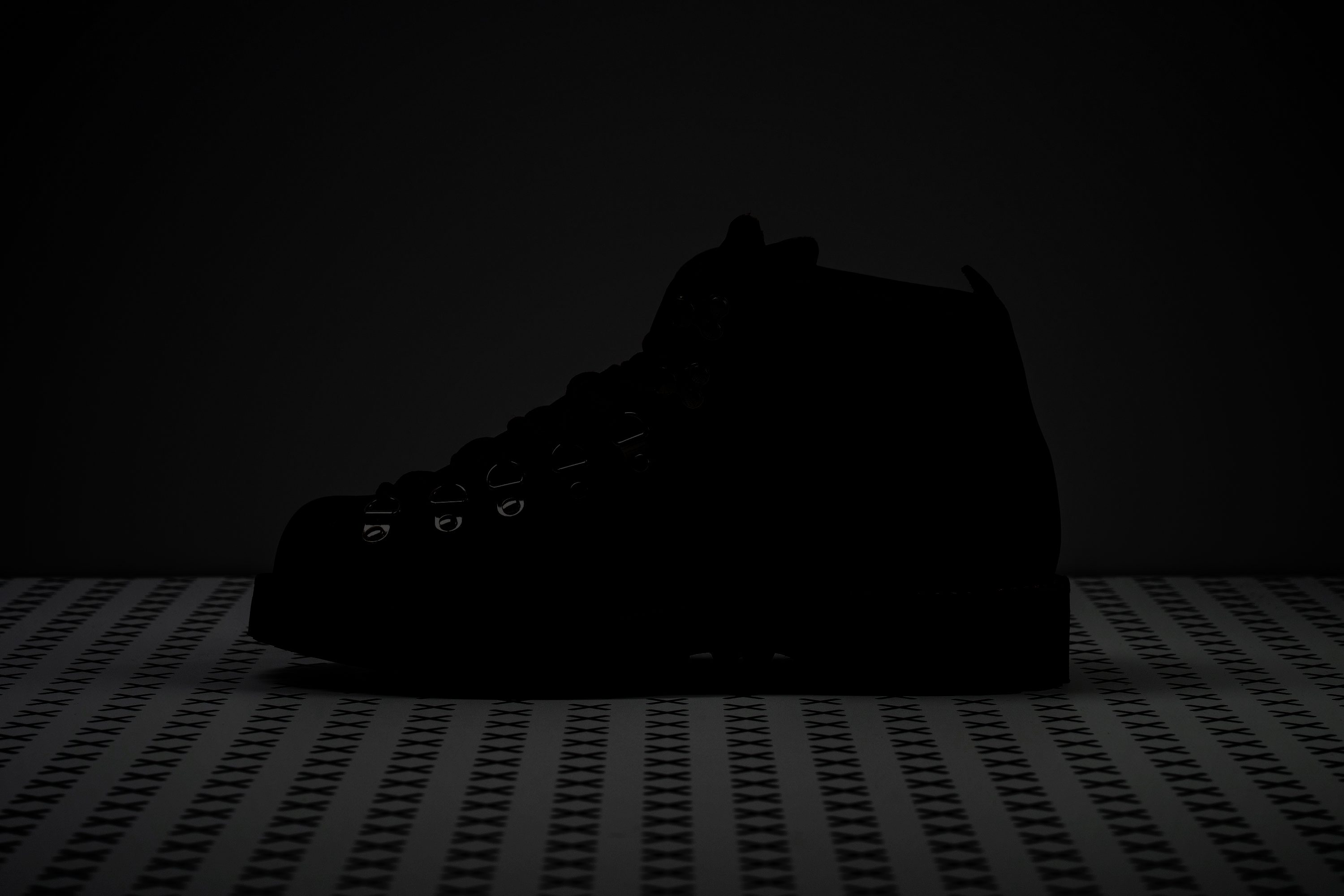
| Mountain Light | No |
Tongue padding
The topmost part of the tongue is generously padded to prevent lace bites and pressure. Our caliper showed that it is 9.9 mm thick which is standard for a hiking boot.
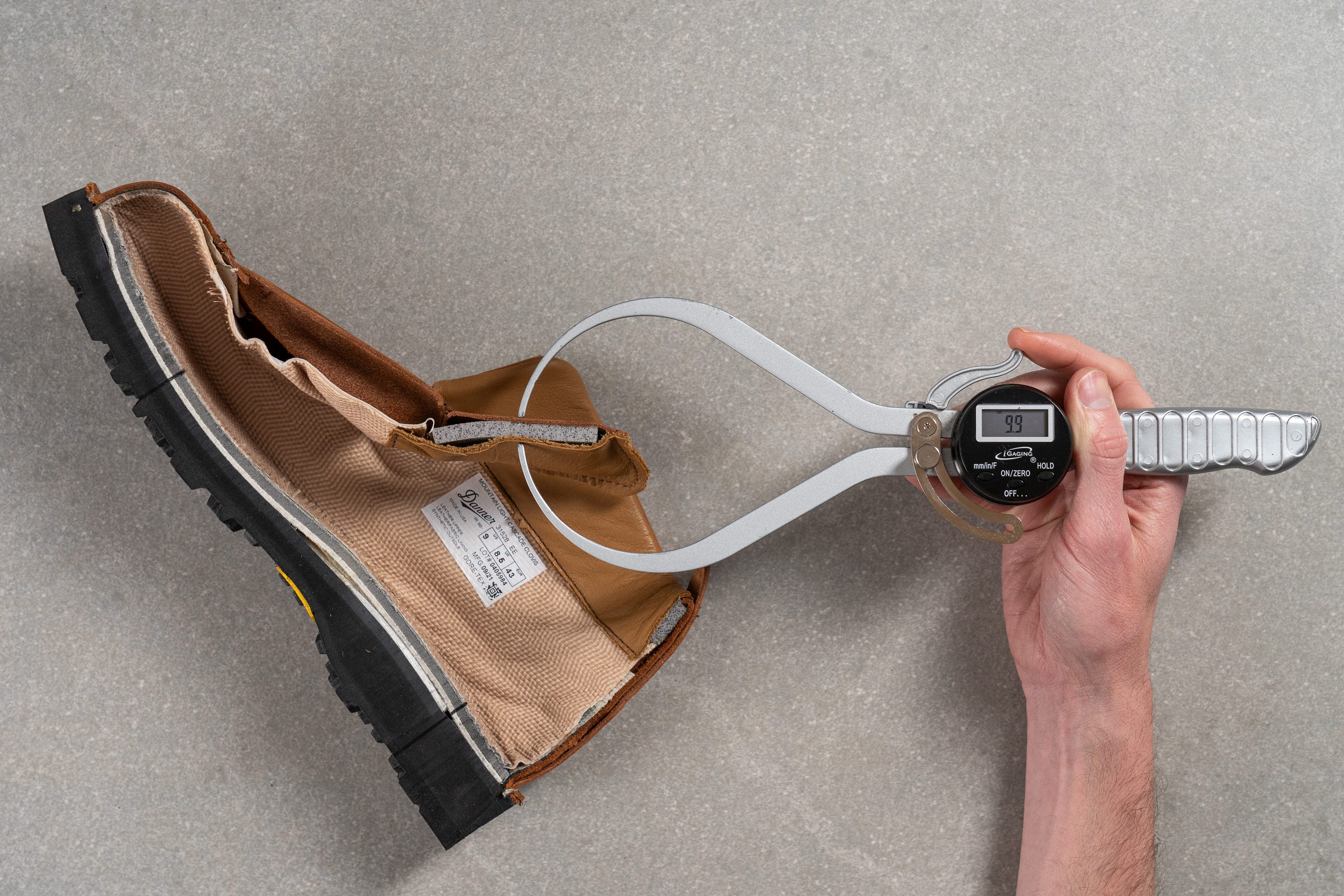
| Mountain Light | 9.0 mm |
| Average | 11.2 mm |
Tongue: gusset type
What makes the Danner Mountain Light feel so secure around the foot is the old-fashioned one-piece leather upper.
It has a fully-intergrated tongue that folds in a practical way to prevent debris and water from getting inside the boot.
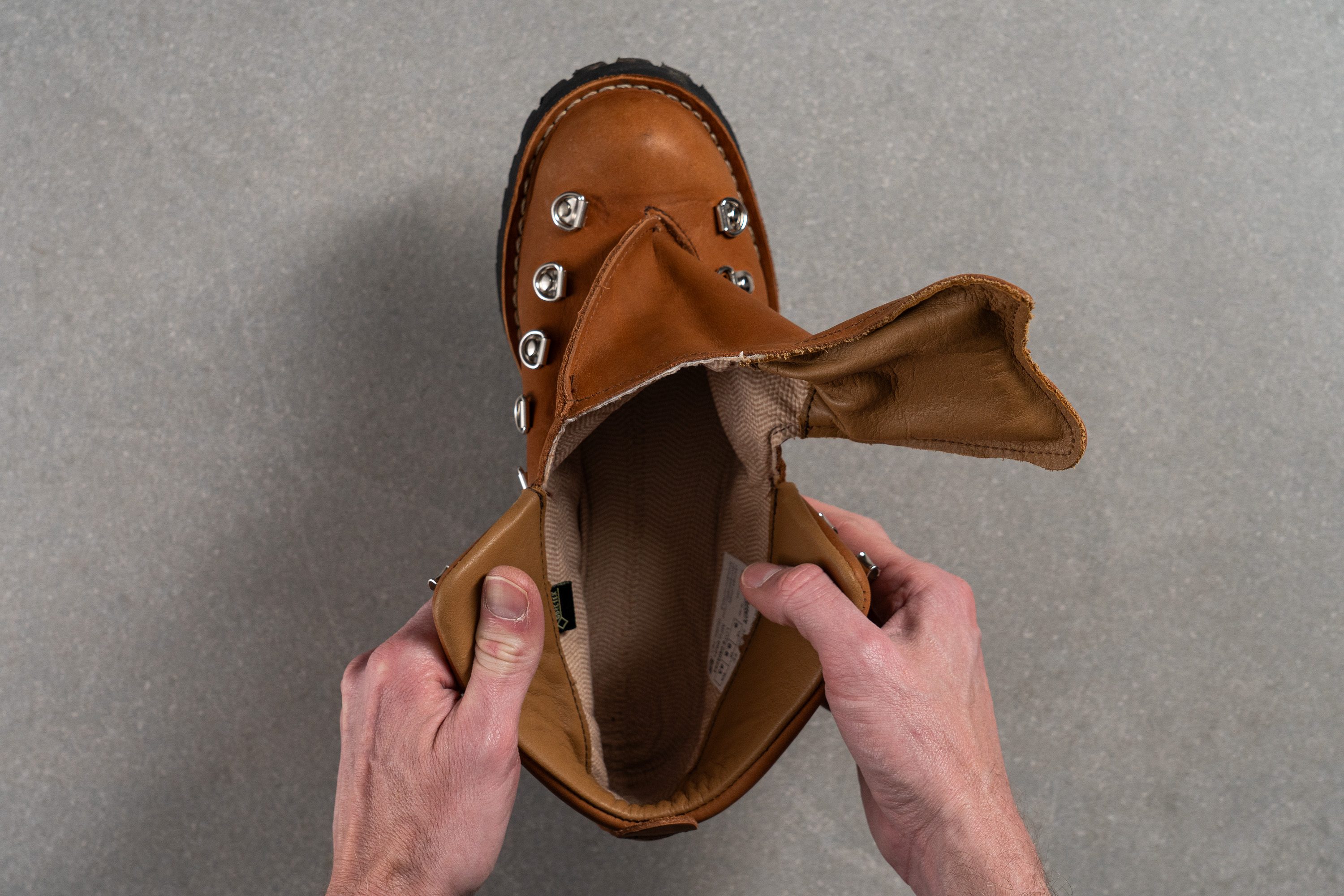
| Mountain Light | Both sides (full) |
Heel tab
This Danner boot comes with a tiny pull tab at the back of the collar. Because it is so small, we didn't find it very helpful. However, it wasn't a problem as the boot is quite easy to slide into anyways.
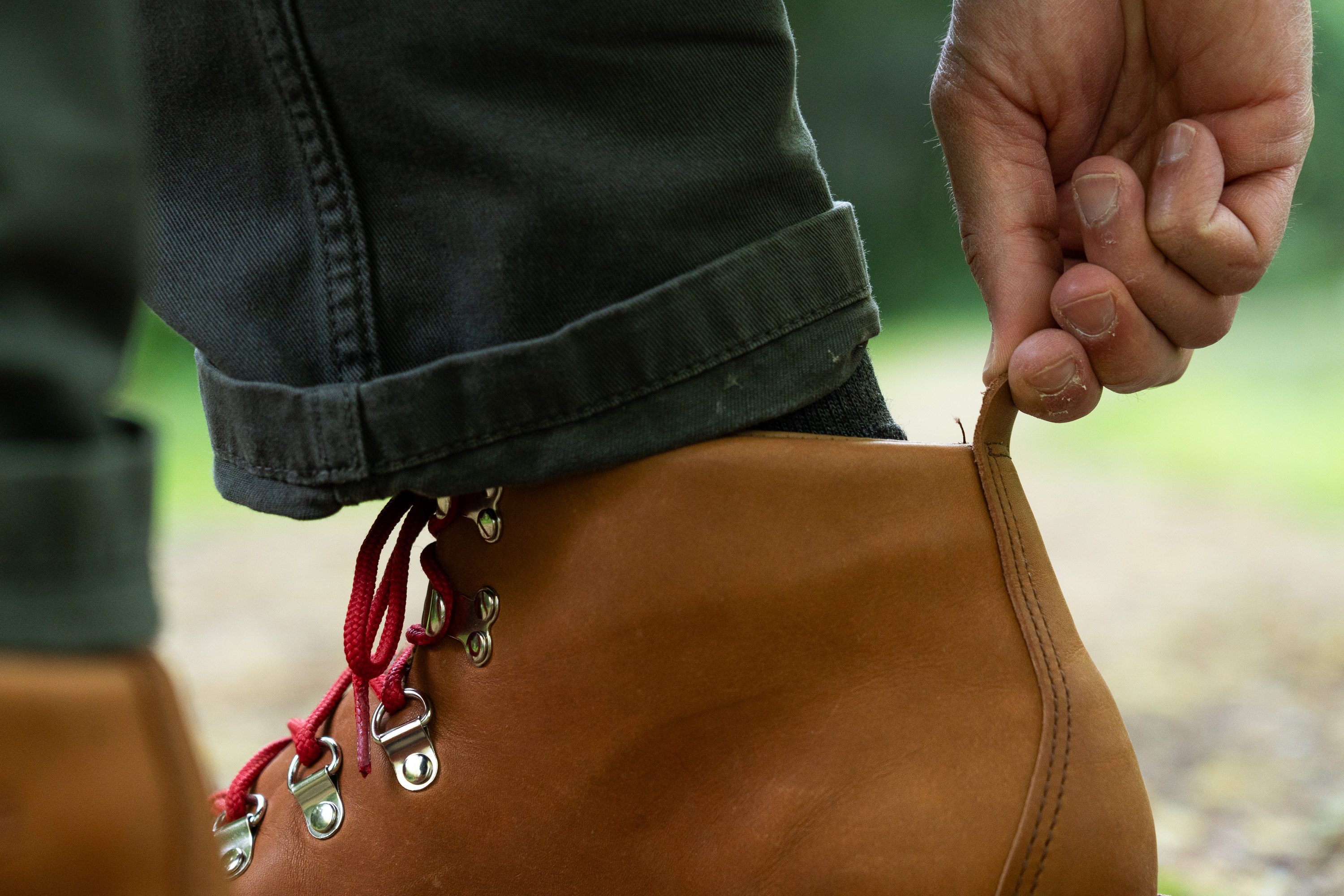
| Mountain Light | Pull tab |
Break-in period
Do expect a hard and lengthy break-in period in the Mountain Light. DO NOT wear this Danner boot from the box to the trail!
Start by wearing it around the house with a pair (or two) of thick socks for a couple of days first. We also recommend having some band-aids close by as there is a high chance of developing blisters, particularly in the Achilles.
